#but but miyazaki and i agree that he wasn’t.
Text
book howl was so real for abandoning his professional career and academic life at the moment a fantasy witchy world was available you go king wear fancy clothes! do magic! fight capitalism! don’t communicate your basic feelings! annoy the woman you would die for!
#look look i know diana has never said well howl was not interested in any girl unless her name is sophie#but but miyazaki and i agree that he wasn’t.#womanizer? a man who can’t even play the guitar?#book howl#howls moving castle#hmc book#book#howl pendragon#sophie hatter#hes living the best of life
2K notes
·
View notes
Text
Since some things related to Frontier have been recently translated, I thought I’d call attention to some things I personally think more people ought to know about:
You know that infamous line about flying over the trash can in Frontier’s OP? It’s a reference to Wada Kouji’s demo tape getting tossed in the trash can and having it be fished out by sheer happenstance, leading to Butter-Fly and the rest of his career. The lyricist, Yamada Hiroshi, seems to have been very inspired by it.
Kouji seemed to be the most popular character among magazine readers during Frontier’s airing. Probably not surprising.
Original series producer Seki Hiromi, who, bless her, is known for her astonishing amount of frankness about things, finally formally revealed the reason Frontier was the last Digimon series: the economy around anime IPs was just bad in general. (Of course, it was previously inferable if you looked at Tamers having barely over half of 02′s toy revenue and the fact the viewer ratings were already dropping fast enough for higher-ups to start panicking even back then.) Seki had earlier allluded to having “a hunch” that this would be the last Digimon series, but now we know for sure that this hunch was going on before the series had even started planning (and if you look at merch sales patterns, it’s too obvious they were already cutting off lines before Frontier had even aired that much). So if you see someone talking about Frontier “killing the franchise”, we now have tons of evidence that proves otherwise. It didn’t save the franchise either, but it wasn’t the primary killer; rather, it was their last desperate effort.
On the flip side and on a happier note, because everyone seemed to know it was the probably the last one, it seemed the staff was intent on making this as good as they could make it and going out in a dramatic, explosive fashion so they wouldn’t have any regrets. This probably explains a lot about Frontier having that kind of festival-like, bombastic atmosphere -- and it seems the second ED was explicitly written with the idea of gathering all of their feelings together and making something as heartfelt as they could.
Kouichi and Kouji are apparently based on...something. (Seki calls it “Cain and Abel” in the interview, but the translator linked above believes she may have actually meant Castor and Polllux. Or maybe it’s both. We’ll never know unless we get another more accurate statement on this.) This is apparently why Kouichi died. Also, he’s apparently not dead because they didn’t want to leave the last Digimon series on too sad of a note. I don’t want to think about whether this implies he would have stayed dead if not for that. Let’s just agree with Takuya and the others that it was a miracle for the poor kid.
Apparently The Last Element exists because Miyazaki was personally distressed about not getting to be on Tamers and thus personally went up to the music producer begging to be on an insert song.
102 notes
·
View notes
Text
Hit Play, Pause, and Purr
Word Count: 974
Summary: When Chat Noir has nowhere to go on Halloween, Marinette decides to invite him over for a movie night to watch Kiki's Delivery Service.
Notes: A huge thank you to @auroraesque and @foreverwolf for being my beta readers! I needed a break from my 9 to 5 and, the next thing I knew, I was thinking about a Marichat movie night. It was just a fun, short little escape for my day, and I hope you enjoy!
“Wait, I’m confused, I thought you said we were going to watch an anime movie.”
“This is anime, kitty. Haven’t you ever heard of Hayao Miyazaki’s animated films? Or Studio Ghibli?”
Marinette couldn’t help but giggle at Chat Noir’s confused pout, but his smile reappeared as soon as his eyes slid over and met hers.
The boy poked a finger at the tip of Marinette’s witch hat, his touch light. The hat sat straight up on her head, the sheer black base adorned with glitter and starry sequins; it would be all too easy to accidentally snag a claw in it.
“I can’t say I have, Purrincess.” He hoisted their shared blanket up around his head, flattening his ears as he burrowed deeper. “But it’s got an adorable black cat and it’s one of your favorites, so I’m in either way.”
Yesterday, Ladybug had asked her partner if he had any plans for Halloween. After all, the holiday itself seemed right up his alley — all dark and playful and sweet. But when he admitted with a half-hearted shrug that he had nothing going on, she made sure to flag him down later on as Marinette and insist he come over for a movie.
Now, the two sat cross-legged, their knees just barely brushing on top of the nest of blankets and pillows scattered about Marinette’s room.
In preparation for the night, she had put out a wide variety of macarons — Marinette wasn’t sure what flavor, exactly, was his favorite, though he appeared to gravitate toward the passion fruit ones — as well as a plate of chocolate croissants.
“Well that’s all the more reason we have to watch it!” she exclaimed, shaking the remote. “It’s practically sacrilege to love anime but not know Studio Ghibli. We’ll have to watch more of these movies later on.”
She hadn’t lied, of course. Kiki’s Delivery Service was one of her favorite movies and had been since she was a small girl.
But this year she had the added motivation of dressing up as a witch, knowing that a certain black kitty would be by her side. Halloween was for dressing up, so who said she couldn’t cosplay a little… even if she was staying in?
Throughout the start of the movie, Chat Noir remained fixated on the screen, grinning when Kiki took flight and nodding in approval after she was affectionately taken in by Osono, the baker.
For Marinette, watching Chat Noir’s enjoyment was almost better than watching the movie itself.
“Wait.” Chat Noir grabbed the remote to pause the movie. “So how is she going to get the toy back?���
Kiki was in the middle of one of her first errands, but it had already gone awry. Jiji had to temporarily take the place of the small cat figurine she had been hired to deliver, and now she had to hunt it down if she was to save the job and get her beloved cat back.
“That’s what she’s trying to figure out too, Chaton.”
That adorable pout was back. Marinette grabbed a passion fruit macaron and popped it into his mouth with a gentle smile.
“We’ll just have to find out together,” she said.
Chat Noir took a bite and put the cookie down before crossing his arms in feigned annoyance.
“But you already know the ending,” he pointed out.
“Well, then I’ll pretend I don’t.”
Chat Noir paused in consideration before stealing Marinette’s hat and fixing it onto his own head with a satisfied grin. It sat slightly askew, fitting over only one pointed ear.
Marinette chuckled and suppressed the urge to reach out and right it for him.
“Okay, we can pretend,” he said. “After all, I don’t want to bring the wrong cat-itude to movie night.”
“Nope,” she agreed. “We wouldn’t want you feline left out.”
The hat started to slide sideways.
Before it could fall, Marinette quickly leaned forward to grab the brim with one hand and steady herself on his shoulder with her free hand. The hat crisis was averted, but—
Marinette froze.
Oh God, she had gotten really close.
The television provided just enough light for her to make out the faint blush pooling into Chat Noir’s cheeks as he met her eyes, mere inches away. She looked away and bit her lower lip as she felt her cheeks begin to warm, as well.
“Umm, let’s keep watching,” she suggested. She put down the hat and hastily pulled back to reach for the remote.
Before she could hit “play,” however, Chat Noir pulled her back, one hand tugging gingerly on her wrist.
“You can, um, sit closer,” he mumbled self-consciously. “If you want to, I mean.”
The warmth in Marinette’s cheeks slowly traveled down to her chest, leaving her giddy and nervous in a way that… was actually not as scary as she had expected.
Despite the initial awkwardness of the moment, neither of them pulled away from the contact.
“Okay,” she said slowly. “I… I’d like that.”
After retrieving the remote, Marinette sat back and tilted her head to rest on Chat Noir’s shoulder. Slowly, he rested one hand on her knee and leaned his cheek against her hair with a contented sigh.
The rest of the movie was infused with this hesitant warmth, the night passing with a sense of companionship that was so new yet so familiar all at once.
Eventually, Kiki would get her power of flight back. She would save Tombo and write to her parents, assuring them of her newfound joy.
And under their shared blanket — wrapped in fleece and dessert crumbs and laughter — Marinette felt just as happy. In fact, she thought she had never experienced anything quite as sweet as having Chat Noir’s infectious smile so near to her own.
She wouldn’t have wanted to celebrate Halloween any other way.
#miraculous ladybug#ml fanfic#miraculous fanworks#marichat#marichat fluff#halloween ficlet#ml ficlet#halloween#chat noir#Marinette Dupain-Cheng#rain writes#miraculous fanfic
35 notes
·
View notes
Text
Week 4: Art as an act of love - Why we interpret nature through art
When I think of interpreting art or the gift of beauty I think of a moment from two summers ago when I was working as a field biologist. The task of the day was an anuran survey. We were at the site after dark, listening for frogs and toads. I love frogs and toads, truly, but I wouldn’t personally call many many dozens of spring peepers calling beautiful (picture many many small angry cats yelling at each other). No, the beautiful thing was on the walk back when the whole forest lit up with fireflies; thousands of glowing bugs floating down the trail in a forest dense enough to block out most of the ambient light. It was like standing in a crystal clear night sky; my two co-workers and I silently agreed to turn off our headlamps and just stand there for a while.
I share that story because I think it captures how I feel beauty and art should be interpreted. I didn’t need to be told fireflies are beautiful, I didn’t need to understand the biochemistry that lets them light-up or why they seem to love this random wooded area behind a train station, but I never would have been there in that moment if I wasn’t a biologist with a miraculous stroke of luck. To be clear, please don’t go hiking through private property at night looking for fireflies, it's unsafe and you're more likely to just get lost and mosquito bitten half to death. My point is that I was in the right place at the right time and magic happened, and as interpreters, I think we can let nature speak for itself in the beauty department if we only get our guests there at the right place and time.
These moments are rare and lightning doesn’t reliably hit twice so we can also share these events through art and stories. You felt a little calmer when you read about the fireflies right? You have an image in your head about what I might have seen and really, that image could be just as beautiful as the one that lives in my head. I’ve talked about my friend the photographer on this blog before as well and I think that is another great way to share and interpret beauty. He has always had a talent for noticing little things, an a-symmetrical leaf, the pattern of plants in the grass, and he can highlight beauty in what he sees by taking a picture that lets others look through his eyes.
Now, I couldn’t talk about art and beauty on a nature interpretation blog without talking about my personal favorite comfort media: Ghibli movies. If you don’t know what I’m talking about, congrats you have plans tonight: find your comfiest blanket and look up Spirited Away on Netflix, you can thank me later. Spirited Away shares the story of a young girl who accidentally travels to the spirit realm where she ends up working at a bathhouse full of nature spirits. The movie personifies rivers, radishes and ducks and almost every other thing you could find in a forest and brings them into a colorful world where they can be cleansed and relaxed. It’s an interesting metaphor for how pollution affects the natural world. Metaphors and personification aside, the film also has beautiful imagery of nature, with calm grassy fields, wide lakes and mysterious mossy forests. You don’t even have to step outside to be moved by Miyazaki’s interpretation of nature and to understand the messages about our responsibilities in caring for it. It’s my favorite example of how interpretation of nature through art can simplify complicated ideas into a single work and communicate them without lecture.
At its core, art is an act of love - it takes time and labor to create and can wordlessly communicate the artist's belief that something is special, and therefore worth appreciating, protecting and thinking about. I suppose my thesis in this post is that art captures and shares moments that are special, so we can connect with nature on an emotional level and build a sense of value through finding the beauty in a place.
Images from Spirited Away (2003)
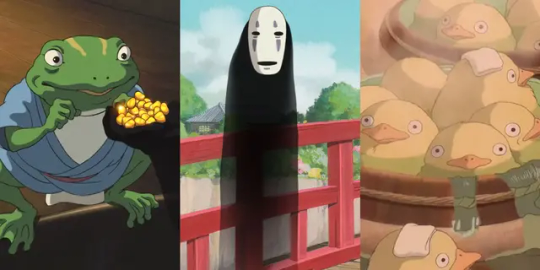

1 note
·
View note
Text
【Interview/Entrevista】An Cafe (antic cafe), Rock and Read vol.102 #3
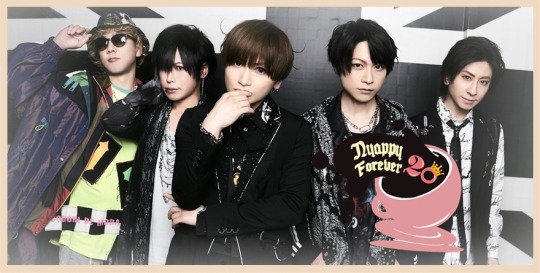
Formed in 2003, in 2010 there was a suspension of activities, in 2012 there was a resumption of activities, in 2019 there was a new suspension of activities, in June 2022 there was a resumption of activities. The members are Miku (vocals), takuya (guitar), Kanon (bass), Yuuki (keyboards) and Teruki (drums). On January 5th (Thursday) and January 6th (Friday) 2023, they will perform at Zepp Haneda for a revival event, “LIVE CAFE 20th Anniversary 「Reiwa from First NYAPPY o(≧∀≦)o 」”. www.ancafe-20th.com
Visit Nyappy Forever Web: https://nyappyforeverbr.blogspot.com/
PART #3
Michiru from LOOP ASH, who's been taking care of you since the indie days. He's a good person, isn't he?
Miku: Me, I met Michiru a lot during the hiatus. He was really worried about the members, even though I was barely active myself, wasn't he? So even though I didn't need to contact him, he did contact me saying, "Let's have lunch." Even now, he often says, "Building memories is important. Enjoy the time you spend with the other members." I feel that they are working to enrich our lives.
Michiru Michiru experienced a serious illness. Maybe that's why he teaches us the importance of living a life without regrets. By the way, when did you hear about the Osaka Muse event?
Miku: It was the end of last year. Michiru-san told me and I told Teruki about it. So Teruki got in touch with the other members.
Did the members keep in touch with each other during the hiatus?
Teruki: I helped a little bit with Kanon-san's solo, and Yuuki was there too, so there was a time when we were both involved. But we haven't seen each other much lately. As for Miku-kun and takuya, I hardly had any contact. In the midst of this, before the Muse theme came up, around last summer, I got a call from Shuto Miyazaki, an actor I have good relations with. He really likes An Cafe, and I knew from before that his mother was listening to the songs with him. His mother had cancer and listened to An Cafe all the time in her hospital room. So I contacted Miku-kun. Then Miku-kun said, "I've been indebted to a lot of people so far, and if there's anything I can do to repay them, I want to do what I can. That's why I want you to let me sing. "
Miku, do you regret your first hiatus and have you always wondered how to make up for them?
Miku: A fan once told me that: "Bands don't last long, and even if you support them, they will eventually disappear. We fans don't have the right to say anything about the members' decisions, so we respect the opinions of the members. members". Even saying "Everybody's band" and singing, we feel guilty for imposing our feelings on them. A band cannot be active without fans.
Kanon: If you ask me who I play for, it's whoever wants to listen. I also continued with this thought for three and a half years.
Just as when activities stopped, a flow was gradually created, and this flow reached where the five would gather, it overlaps the moment when each of their feelings unknowingly directed them to AnCafe.
Teruki: When I heard Miku-kun's voice on the phone, I thought, "This is my family's meal!"
What does that mean?
Teruki: It was so nostalgic. That's when I couldn't hide my desire for An Cafe. Just when we were talking about things like, "I wish we could go on tour again," Muse-san appeared. I'm a former member of the band so I know it's selfish, but I really wanted to get back to playing with AnCafe so I got in touch with all three.
In fact, attending the event and being interviewed with everyone like this today... Could it be that no member was against this idea.
Teruki: Well, that was everyone's reaction. Takuya said, "Wow~, I wonder if I can play~" and was very worried about the schedule.
takuya: Although I gave up on my own initiative, I had expectations that this day would come someday. I was so happy that I said, "Please let me play again."
Teruki: What did Yuuki say?
Yuuki: "I'll play~".
Teruki: Kanon-san wouldn't want to wait until the announcement date that was agreed to tell people about it, so I consulted with Michiru-san and kept it a secret for a while (laughs). The day of the announcement was approaching and I told him it was time for us to talk.
With Kanon's prior consent.
Kanon: About half a month before the announcement, I was in a situation where I had no choice but to say "yes" (laughs).
Were you sure Kanon wouldn't say no?
Teruki: I thought it sure would, 99.9%. Because a year after leaving An Cafe, he attended Miku-kun's birthday event. And yet, when the five of us decided to do it, there was no way he could refuse (laughs).
How did you tell Kanon about this?
Teruki: Miku-kun, he and I, the 3 of us went out to eat together, but at first when I invited him saying, "Kanon-san, there's a singer who wants to sing your songs, so I'd like to introduce you. Let's go out to eat together the 3 together".
Was he surprised (laughs)?
Teruki: When I said I was going to introduce a singer, I was very careful and cut my hair (laughs).
Kanon: I was meeting you for the first time...
At the event in Osaka, you performed 6 songs on stage for 30 minutes. I was allowed to watch some of the video the team sent me, and I was surprised that the background sound was so solid compared to before the hiatus. It can be said that performance was tight overall.
Teruki: I've been doing musical activities for a long time, so naturally I have to keep growing (laughs). But in terms of the rhythm section, Kanon-san's performance has improved tremendously.
Kanon: We had four rehearsals, that's when I felt the difference, in the last three and a half years, the only time I really played bass was when I was recording at home. But I also had connections with other musicians, and even though I didn't play, I felt like I learned a lot just by listening to other musicians perform. I have become better able to distinguish between "this is good sound" and "this is not good", or perhaps I have had many experiences that have enriched my ears.
Takuya-san said that surprisingly his body remembered the movements.
takuya: I started by taking the guitar out of the warehouse and polishing it (laughs), but when I started playing it, I think I was able to play with a better feel than before.
Yuuki: Before the performance, I wasn't nervous at all, and I thought it would be easy, but when I went on stage and heard the sound, my heart started to pound. However, I could feel the atmosphere in which the audience warmly welcomed us, and I was relieved.
Part #3 Comming soon...
#an cafe#antic cafe#an cafe miku#an cafe takuya#bou an cafe#kanon an cafe#yuuki an cafe#an cafe teruki#jrock#jpop#harajuku#nyappy#cafekko#an cafe rock and read#rock and read#an cafe translate#アンティック-珈琲店-#アンカフェ
4 notes
·
View notes
Text
The Boy and The Heron: Disappointing (SPOILERS)

By: Peggy Sue Wood | @pswediting
The Boy and The Heron, GKIDS/Ghibli’s latest movie, was something I learned of completely by accident while scrolling through the Fandango App. I was on the search for suggestions of films to see on my first day off in a long while. What initially surprised me, considering I run an anime blog and have seen literally nothing about this from the people I follow most closely, wasn’t just that it had been out for a month. It was that the film’s trailer promised nothing regarding the story beyond some intriguing imagery. Unfortunately, even the famous studio’s typically wonderful art fell short of expectations in this film, often overdoing it on the images and relying too much on aesthetics instead of story. The film, directed by Hayao Miyazaki, who is supposed to have retired repeatedly but keeps coming back film after film, attempted to blend elements of what made Ghibli great with a new story about re-building yourself and your family post-war… but, ultimately, the film left me feeling underwhelmed and dissatisfied. More on that in a moment.
The full movie has been summarized on Wikipedia, so if you decide to read it instead of watching it, I can assure you that you will have missed nothing of importance plot-wise, character-wise, or story-wise.
One of the major drawbacks of this film is its lackluster character development. The protagonist, Mahito, was initially interesting. He’s recently lost his mother, and within a year, his father is remarrying his late wife’s sister with another baby on the way. These are complex relationships, and the characters’ interactions at the start lend to the awkwardness felt by our MC. However, as the story progresses, we don’t really get to see his motivations for changing his relationship with his aunt to that of a motherly one. Rather, it feels forced.
The start of the movie was good, but after we entered the mysterious tower, it all fell apart. If you haven’t seen the movie, I suggest reading that wiki page linked above because I’m not going to explain the tower.
Lady Hime, Mahito’s mother, is spending a year of her childhood in the tower, as we learned earlier and figured out by context clues, but Mahito doesn’t recognize her. She figures it out first, it seems. Natsuko, his aunt, came to the tower to give birth (why? We don’t know). Mahito goes into the tower to get her and almost immediately starts calling her mother after finding her, but not enough time has passed in the movie to change perspectives, and nothing big has happened to imply that there should be a change in the relationship.
This is not like Spirited Away or Howl’s Moving Castle, where characters have the time to grow and reflect and change perspectives. This movie is just a flourish of movement from one scene to the next with what seems to be a single night passing in the entirety of Mahito’s time in the tower.
At the end of the movie, I was trying to figure out what the message of the movie was. The person who went with me suggested that perhaps the story is about how Lady Hime would have approved of the marriage and of Mahito’s moving on. Like, you are forgiven for your survivor’s guilt, but that’s not exactly presented here very well. I mean, I agree that this idea is present in the movie, but that’s just told to you. It’s shown so openly that you don’t get to feel it as an audience member. Instead, everything feels forced, making it challenging to empathize with emotional peaks happening. Like the great uncle, too. WTH?
Upon reflection of the movie, the main issue appears to be pacing. The story unfold rapidly, stitched together by aesthetic moments rather than the rich world-building or the slower, character-driven moments that typically foster connections between characters in Ghibli films. As soon as we entered the tower everything moves too fast and so you can never get comfortable. Like, I couldn’t help but reflect on the significance of food scenes in movies like Howl’s Moving Castle, Spirited Away, and Ponyo. While these scenes were undoubtedly aesthetically pleasing and quick, they carried additional layers of meaning.
In Howl’s Moving Castle, for instance, cooking together and sharing a meal symbolize the coming together of the household, marking Sophie’s acceptance as a welcomed member of the Castle by Howl and Markl. In Spirited Away, food serves as a representation of greed and gluttony, echoing a central theme in the movie. Ponyo‘s ramen scene, on the other hand, is infused with surprise and magic, introducing that the “mundane” human world has its own unique and special aspect.
In contrast, the food scene in The Boy and the Heron feels hollow. The scene lacks significance, given that we already have more than enough clues suggesting that the fire girl is the boy’s mother, the bread-eating moment loses its impact and fails to contribute meaningfully to the narrative.
On that note, while the cinematography and visuals were very much reflective of Ghibli’s style, right down to the often deliciously glistening look of food. However, this time the abundance of effort put into round, bounciness of the water and food items become too much of a focus. I mean, Mahito eats bread with butter and jam, and the jam goes everywhere. He hits his head with a rock and the blood gushes out like a waterfall. The visuals didn’t lack in flair but didn’t really elevate the storytelling as the movie progresses. It really turns the film more into an aesthetic appreciation of all the things Ghibli has done to make the ordinary magical rather than something that was adding to what was happening. It started to feel cliché even.
The dialogue often felt stilted and unnatural too, adding to the awkwardness. The script relied heavily on context and lacked the nuance required for a thought-provoking narrative beyond the first half hour or so. The attempts at injecting humor or emotional depth fell flat, leaving the audience disconnected from the characters and their journey.
Also, what was up with the birds? Philosophically nothing. Everything involving the parakeets, the Heron, and the pelicans had no meaning.
In the end, despite the film apparently getting a grand release (one that literally slipped by me), it failed to live up to its potential, delivering a lackluster experience. Despite a promising start to the film, the middle and end suffered from poor execution, underdeveloped characters, and uninspired use of their well-known art style. While some may appreciate certain elements, those seeking a truly engaging and well-crafted movie might find themselves disappointed with this forgettable offering from GKIDS. Instead, I encourage you to look at their earlier work.
–
If you enjoyed this post, please consider buying us a coffee, leaving a comment, and/or subscribing!
Copyedited by: Katherine Cañeba | @kcserinlee
1 note
·
View note
Text
i have heard your voice, weighed your every choice || futaba || trial 6.2 || re: im so owned
Futaba Takemoto-Mashita hadn’t wanted much from life for a long, long time.
She can’t say with certainty what the real Futaba would have wanted had she lived long enough to decide, but she’s confident she would have thought of something. That Futaba was vivacious, confident, full of willpower and energy, and that Futaba was never her. They shared a face and a name and a voice, but the Futaba of today was never so lively or sure of herself as the girl she was supposed to be had been. She simply did what she felt she was meant to - she didn’t have any particularly strong desires or likes or dislikes, and while she may have felt that something was off, she saw no need to step outside of the well-kept bubble of familiarity she’d built over the years. No matter how uncomfortable things got, she could easily fall into a comfortable enough routine, and for nearly a decade, that was fine with her.
But she’d met people here that changed that, and Jinpachi Otsuka - or Juzo Miyazaki, rather - was one of them.
“Now you have two hands to watch out for, Hanji-kun!”
“What tHE AAGH– I can’t believe you’d turn on me– when were ya on Ozu’s side?!"
”… We are both devils. I’m simply fostering team spirit.“
Frankly, there were few people she felt strongly for at all for a good while. Before she’d grown into herself, her family were the only people she knew how to love. Everyone outside of that was simply an acquaintance, a peer, a coworker. She had no attachments to anyone aside from those she was made to have an attachment to, and she rarely saw most of them anyway. She wasn’t entirely alone, but considering her circumstances, she may as well have been.
She can’t recall when it was she began to care so deeply for Juzo. Maybe there was an inkling of that big sister instinct when Aldie had hunted them down on the beach, or maybe it was there when they’d first arrived on the airship and he’d shared his worries with her. Maybe it was when she agreed to join him on the ferris wheel even though she’s terrified of heights, or when they’d ditched the minigame at the amusement park to play Candyland with Hanji and Spud (and teamed up to bully the former), or when he helped her get ready for the gala and they gossiped about the motive and their own small secrets. Maybe it was when she said he could call her by her first name, or when they talked about what they wanted to do with their lives in the future, or when he’d still treated her exactly the same after they all found out what she was. Maybe it was when they shared their insecurities with one another, or when he asked to call her onee-chan, or when they’d simply rummaged through the old convenience store in the abandoned village together. Maybe it was some small moment they’d shared that she wouldn’t have even thought twice about, or maybe it was everything - all the big and little bits of time they’d spent together - that set in stone who Juzo was to her.
"I mean…if you don’t want them to be your family then…you really get to choose your own family.”
“… I’m not certain what I want them to be, and vice versa. I think… that will take quite a lot of talking between us to figure out. But I don’t think that bars me from choosing who I’d consider family, either.”
They’d talked briefly about family, and about how nothing could really stop them from picking their own. To Futaba, that’s what Juzo was - he was family, a little brother that entered her life far later than she would have wanted.
And from the look of things, he’d be leaving it far sooner than she would have wanted, too.
Actually wanting anything was new to her, but Juzo was someone who taught her how to want. And at the moment the blade that once belonged to Juzo skewers his chest, Futaba wants nothing more than to cut down the man that took his love for granted. She wants him to hurt - genuinely, not the sort of “overwhelming despair” he’s searching for. She wants him to suffer. She wants everything he’s ever hoped for to crumble beneath his feet, and she wants it to matter.
Because all that ever mattered to her was seeing Juzo happy.
She wanted to protect him, make sure he was safe, make sure nothing could hurt him anymore.
She wanted him to find some way to lead a normal, peaceful life like he’d wanted.
She wanted to get away from everything with him and Hanji.
She wanted him to have a chance to ask Hanji about an apprenticeship, and if that didn’t work out, she wanted him to follow whatever path he felt fit. Maybe he’d become some sort of builder.
She wanted to see the sort of person he’d grow into.
She wanted him to be there when she grew, too.
But she wouldn’t be getting what she wanted now, and she was going to make sure Jinpachi wouldn’t either.
So, even though there’s a horrible storm of anger and misery and grief threatening to take her over, Futaba doesn’t let herself falter. She can’t, not when there are so many lives on the line, and especially not when she’s positive it would make Jinpachi’s day to see her break. At the very least, she’d much rather find a way to break him first.
She’s quiet for a long while, calming herself enough to speak once she’s finally found the words to do so.

“… How annoying. Are you done with the dramatics?”
She briefly wonders if he was this grating at Happy Smiles. He must have been.

“There isn’t much I can say that hasn’t already been said… but to be clear, there’s not a word I’ve heard that I disagreed with. I assume you were hoping for an especially strong reaction to what you’ve just done, but I’d rather not waste more time on you than is necessary. … Though I do think I can say with confidence that I was a better sister to him than you ever were a brother.”

“… If you could make your explanation quick, please. I’d like to go home now.”
0 notes
Text
Castle in the sky theme


Would Miyazaki agree with Bill when he drops “God is a word, and the argument ends there”? I’m reminded of the sentiment in songs such as Bill Callahan’s “Oh do I feel like the mother of the world, with two children fighting”. Miyazaki seems to be mourning not just for his own mother’s loss, but for the loss of the innocence of the world. The environmental themes that feature strongly in this film and other Miyazaki themes also delve into the concept of Mother-Earth. Through this prism, we can perhaps start to see Castle In The Sky as being something of an elegy to his long suffering and recently departed mother. Hayao has first-hand experience of the fear of being a motherless child from a young age. Perhaps it is not surprising that orphan characters feature prominently in this and other of his films. This means Hayao’s mother was gravely ill for much of his formative childhood years. Miyazaki’s mother is said to have been of weak constitution, and had spinal tuberculosis in the post-war years 1947-55. How much of Miyazaki’s own mother’s character can be found here? Captain Dola, is strong and commanding, but also compassionate and warm. Take a look at the character of the boss-mother of the pirate gange in Castle in the Sky. It is hard to imagine that Miyazaki wasn’t using his art to work through his own personal loss at this time. Maternal themes and mother figures permeate the film. Motherly figure of Nausicaa, inspiration for Miyazaki’s first filmīy Frederic Leighton, 1st Baron Leighton – Art Renewal Center – description, Public Domain, Ĭastle in the Sky Laputa was released around two years after the death of Miyazaki’s mother.

Ancestors, families, look after their own. The ticket only works if you have the right blood though. How does it get you there? Through the medium of flight of course, this time pure and unadulterated by the need for mechanical devices, technology or gadgetry. The ancestors even have a magical stone that they pass down through the generations that functions as a special ticket to their exclusive world. The idea of a mythic people who are guardians of a magical other world is connected to the Confusian ideals of respect, even deification, of ancestors. Sheeta’s memories revolve strongly around the teachings of her mother and the desire to do right in her eyes. Pazu is out to redeem his father’s honour in the eyes of the world. Indeed, Pazu is driven by the desire to vindicate his father’s life mission, to prove the existence of the mythical land of Laputa.
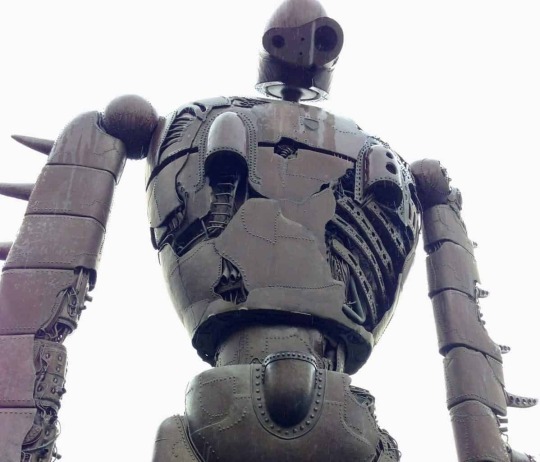
The idea of filial piety, which wikipedia defines as a virtue of respect for one’s parents, elders, and ancestors is seen in the loving affection that main characters Pazu and Sheeta hold for their deceased parents. This family connection leads into another major theme in Castle In The Sky, the relationship between child and parent. This yin-yang style dark and light human coexistence is perhaps even parralled by the darker, Nazi sympathising tendencies of global aviation hero Lindbergh himself. Evil, like the aeroplanes that his dad worked on were used for.įor the Miyazaki, the struggle between innate human ingenuity and human depravity is personal. In the Fandor video, Miyazaki also talks about how the technology of flight, developed by those with noble intent, inevitably gets swept up in the prevailing winds of the time and ends up being used for evil. It was as if an alien hand touched down from Mars. Bill Bryson vividly describes in his fantastic book One Sumer: America 1927 how, when Charles Lindbergh completed the first transatlantic flight from New York to Paris, he was greeted by no less than 100,000 parisians. Flying machines were, and are, a symbol of humanity’s ability to transcend its surroundings. In the Fandor video above, there is an excerpt of Miyazaki talking about his own, his family’s, and indeed humanity at large’s, relationship with the aeroplane. You can see how the aeroplane, and flight more generally, has influenced his work and become such a major motif. Hayao Miyazaki’s father was an engineer who worked on the Zero fighters.
Tokyo to Matsumoto City and Matsumoto Castle.
Demon Slayer Cosplay Costume Gallery 2020.
How To Choose The Best Hanten Jacket or Chanchanko.
Best Japanese Christmas Decorations and Ornaments of 2020.
Kotatsu Blanket and Kotatsu Futon 2021 Guide.
Japanese Language Learning Resources 2021.
Graded Japanese Reading & Listening Practice.
Is a variation on the main Laputa theme ("Kimi O Nosete") adapted for pianoĪnd can be found on the "Piano Stories" album. WARNING: This is not a track from the "Laputa: Castle in the Sky" OST.

1 note
·
View note
Note
Hey you made a post and reblogged another about Miyazakis movies being horny, would be interested to know what you are referring to specifically if your up for it
(I've watched most of his movies at least once, Spirited Away and Princess Mononoke many times and didn't notice anything)
I’ve gotten this ask before and i was actually a little confused bc I don’t remember discoursing about this but I think you’re referring to this post which I reblogged more out of agreement that it’s weird how Western fandom has constructed this weird idea of Miyazaki as a curmudgeonly moral crusader against sex by taking an out of context quote which is mostly about his desire for anime to have a more humanistic realism to the stories. He criticized the antisocialness of otaku rather than any horniness and the example of depictions of women is something he ties to antisocial mess rather than excessive libido like western fandom types try to make him out to be.
Interestingly, Miyazaki was once asked what specific type of otaku he hated the most and you know what his answer was?
Otaku? The people I hate most are those gun otaku. Speaking honestly, I think they’re really low level, and out of firearm fans, the pistol nuts are the worst. They’re the ones that have the most immature character traits left over. Ha ha, don’t you agree?”
I find it really interesting how Western fandom has created this fake version of Miyazaki through an out-of-context quote along with full blown fabricated quotes (which may or may not have been created ironically but tons of people legitimately circulated those believing them to be fully real). Like the guy that’s traditionally been considered the “most mainstream respectable” anime director in the West is given a fake persona of an anti-sex moral crusader by Westerners…. 🤔
Anyway, I realize this wasn’t even your question but as to specific scenes I can’t name any of the top of my head but I fully expect there to be some (actually I’m pretty certain there’s some in Castle of Cagliostro but that’s because it’s a Lupin III movie so duh) because it’s art and stuff like that is literally inevitable and can be perfectly benign, remember that Western cartoons have had moments of “horny humor” since the beginning after all and no one gets worked up over that (well, not to the same extent). Not to the level of Tex Avery or anything but it’s gonna be present.
85 notes
·
View notes
Text


PART 2. LOVE IS FAKE, MARRY A WEALTHY SUITOR
SUMMARY. Todoroki Shouto was a wealthy, young CEO who inherited his father’s enterprise. You were a barista at a local cafe who wouldn’t mind some extra cash. One day, Shouto came in during an early morning shift and tipped you such a large sum of money, you were certain it had to have been an accident. To your surprise and complete pleasure: It was not.
PAIRING. ceo!todoroki shouto x barista!reader
WORD COUNT. 2.5k
GENRE. ceo/barista au, fluff, eventual smut
WARNINGS. none in this chapter
A/N. thank u guys for all the positive feedback on this series so far and i really hope u enjoy this chapter too ! ^-^ xx sof
SERIES MASTERLIST
© myherowritings — all rights reserved. reposting, modifying, copying, or translating of any kind is not allowed. do not read my writing as asmr. do not plagiarize.

It seemed your subtle pleas to the gods to see the mysterious businessman again had been answered, since only the day after Shouto gave you a $100 tip, you saw him at the cafe.
You looked to the skies with a hint of suspicion. This seemed too easy— You were expecting at least a few weeks of your heart pining as you wondered where-oh-where your dreamy customer could have gone. But instead, after a mere 24 hours later, you saw him enter the store in a pair of pressed trousers and a light blue, button up shirt that was rolled just below his elbows.
Blinking, you drew your attention away from his exposed forearms. You knew he was attractive from your first encounter, but was he always this hot?
Sadly, you couldn’t focus too much on that since he had to get behind the line and obstruct himself from your view, and you had to take the order of the next customer.
“Hi! I can take the next person in line.” You smiled. “Good morning! What can I get started for you today?”
After repeating that five or so more times and starting a few drinks on hot bar, you finally reached Shouto’s place and, thankfully, there didn’t seem to be too many patrons piling behind him.
“Good morning, Shouto!” you greeted when he stepped forward to the counter. “How are you this morning?”
“Better now that I saw you.”
Your smile faltered as your cheeks heated up, but you tried to brush it off with a laugh. While Shouto had the definite looks of a so-called businessman playboy, his words held none of the flirtatious intonation as one might expect. In fact, he sounded like he genuinely meant it— Like he was only stating a simple fact and had no reason to be shameful.
It felt both like an attack on your heart and like a refreshing glass of water at the same time.
“How about you?” he continued.
“I could say the same thing,” you said with a chuckle, but you found yourself meaning everything you told him. Though you didn’t expect to see him again at the cafe so soon, you couldn’t deny the instant he walked through the doors, your morning felt just a little bit brighter. “Didn’t think I’d see you again so soon, but this is a pleasant surprise.”
Shouto had the decency to look a little bashful as he averted his gaze slightly. “Yeah. I…really liked the...cheese danishes.”
Surprised, a small giggle left your lips. “Don’t tell me you finished all three dozen of them!”
“Well…” He looked even more sheepish. “I didn’t exactly… I guess you could say that.”
“I’m glad you liked them so much you came back for more,” you teased, looking down at the pastries from the oven you just stocked. “Sadly, our fresh pastry today is a chocolate croissant. I can tell my manager to have cheese danishes made again soon though!”
He shook his head. “Don’t worry about it. I’ll try the chocolate croissants today then. Maybe five dozen this time.”
Five multiplied by twelve… A whole 60 chocolate croissants? Were they all for him? You shrugged, not one to judge. If someone wanted to eat 60 croissants, so be it. Though you did hope he wouldn’t eat it all in one sitting. That might give him a stomachache.
“Alrighty, five dozen chocolate croissants,” you repeated as you typed it into the register. “And would you like any beverages with that? Another flat white maybe?”
“Actually, I’ll have a large macchiato with two extra shots of espresso this time.”
You nodded with a hum. “Long day ahead?”
“Unfortunately.”
“I hope the coffee and croissants can carry you through, Shouto!” you said, wishing his day would go by smoothly. “Will that be all for you today?”
“Thank you, Y/N. I hope so too. And yes, that’s it.”
“Great. $73.24 is your total then! Will you be paying in card again?”
He nodded.
“Go ahead and scan and sign when you’re ready.”
You busied yourself by writing his name and order on a large cup and starting the espresso pulls. Your manager was helping get the pastries and other orders ready this morning, so it was nowhere near as hectic as yesterday.
“Your order will be to your right. It was nice seeing you again, Shouto.” You smiled, giving him a small wave and already wishing you could hold the line up to talk to him longer. “See you tomorrow morning?” you asked almost hesitantly.
He returned your smile with upturned lips of his own. “Yeah. Tomorrow.” Before he left the counter, he pulled out another $100 bill—did he go to a dry cleaners to have his cash steamed and ironed? It was almost ridiculously crisp—and handed it to you. “A tip to show my appreciation for your service.”
“A-Again?” you stammered, eyes wide. That was $200 in two days from just his tip alone. That was more than you made in two weeks when you worked part-time! “Are you sure?”
Whether he had money to spare or not, this was incredibly generous of him and you would never have expected this amount from anyone. And it wasn’t like Shouto made it a scene for everyone in the shop to look at and gawk; he was subtle yet unashamed. Like he wanted to do it for no other reason than to do it.
“Of course. You deserve it for your work, Y/N.”
The customer behind him made an impatient noise and you winced. You wanted to be able to thank him more, but all you had time for was a simple, “Thank you, I really appreciate it.”
Shouto nodded in response before walking to the other side of the cafe to wait for his order while you managed the other customers in line, a fuzzy but warm feeling lingering in your stomach from your bizarre interaction. Money or not, you enjoyed seeing him in the mornings and were already looking forward to your brief conversations that would take place the next days to come.
He certainly gave you something to look forward to amidst the inconsiderate customers who barely saw you as human every morning. Sometimes, that was all you could ask for.
When Shouto left the store and the line had died down towards the end of rush hour, your manager approached you with a curious look on her face.
“That guy named Shouto…?” Miyazaki said.
You nodded.
“A friend of yours?”
“You could say that… We just met yesterday’s morning shift,” you said as you finished up the green tea latte for one of the remaining stragglers from the last hour’s boom. “But he’s really friendly I think.”
“You only recently became associated?” she asked, lifting a brow. “It seemed like you two were quite chummy today.” Then, nudged your side. “He was rather attractive don’t you think? And rich-looking.”
Fumbling with the lid on the beverage, you stifled a surprised cough. Sure, you got along with your boss and thought she was one of the more understanding and kind individuals you have worked under, but gossiping about the looks and potential income of a customer with your 56-year-old manager was not on your bingo sheet as a worker here.
“I…” You called out the order for the latte before turning back to your manager. “He is.”
“Ooh, he’s rich?”
“I meant he’s attractive!” you sputtered, feeling abashed at her blunt words. You thought of the tip he gave you in your pocket and his orders of dozens of pastries. “Rich…maybe so. Not that it matters!”
Miyazaki tsked. “Of course it matters! Marry rich and your life will be easier. That’s what my mother told me and what her mother told her.” She shook her head. “Should’ve listened.”
You laughed, feeling only a little awkward. It wasn’t the first time you heard that sentiment from someone older than you. It wasn’t uncommon for family members or even workers you were close to to share that same advice—if you could even call it that.
While you agreed money could make a lot of things easier, marrying someone for wealth didn’t appeal to you. But you recognized that even that may come from a place of privilege to be able to say.
“He seems like a wealthy suitor for you, yes?”
“Suitor—?” you choked out. “No! I mean— We just met! We don’t know anything about each other really.”
She sighed, “Young people and their obsession with marrying someone they ‘know’ for true love. When do you really know someone anyway?” Waving a hand she changed the topic. “But enough of that. What I wanted to say was next time that man comes in here, we can offer him a complimentary box of a dozen pastries— Since he’s spent so much in so little it feels like the right thing to do.”
“Sure. A complimentary dozen.” Finally. Work. A topic you felt much more comfortable talking about. “That, I can do.”
“And then maybe offer a hand in marriage while you’re at it.”
“Mrs. Miyazaki!” you gasped, feeling only mildly affronted.
“I joke.” She ruffled her hair and smoothed down her apron. “I’m going to make more pastries now. Can you hold up the front?”
“You can count on me.”
“I know I can. Thanks for your hard work!”
And with that, she headed to the backroom where the kitchen was to leave you alone with your thoughts in a quiet cafe. Rush hour ended so there were only a few customers trickling in, most much kinder and more pleasant to talk to than the bustling businessmen of the earlier shift.
Throughout your small conversations with the patrons, you found yourself thinking back to two things— One, how interesting traditional values and teachings in collectivist cultures were and questioning where you fell into place with them, and two…wondering about Shouto.
Tomorrow, he had said before he left. You’d see him again tomorrow.
Oddly enough, you were looking forward to it more than you’d like to admit.
— ✩ —
It was the fifth day of the week, the fifth time he had seen you at the cafe, and he was already tempted to see you again. Would it be invasive to get another pastry after work? Would you even be there working at that hour?
Shouto saw you this morning (along with all the other mornings before that) and yet he couldn’t quell the pull he felt towards you with only the short interaction time you had together. But he would take what he could get without being weird.
He had been told in the past he could be too forward and dysregulate his feelings and scare people off, and that wasn’t something he wanted to risk with you, though he was certainly much better at it now with learning and practice. If he was reading things correctly, you at least seemed to enjoy seeing him during your shift.
“You got more pastries, sir?” an employee from the medical supplies sector asked him gleefully. “I swear they get better each time!”
Shouto nodded with a smile. “I’m glad you like it. I’ll be sure to relay your compliment.”
With the dozens of pastries he’s been ordering from your cafe (each order seeming to grow every time he visited after realizing just how much his employees enjoyed it), he would place them around the breakrooms and staff kitchens in the establishment. Those areas were always fully stocked with drinks and sandwiches and chocolates in case anyone needed a little boost, but nothing seemed to bring as much comfort as freshly baked pastries did. And a different baked good almost everyday seemed to give people more to get excited about.
He owed it all to your sales’ pitch and blinding smile that made him want to buy it. And your personality, of course.
His Personal Secretary had started to wonder why she no longer was tasked with his early morning coffee runs, and Shouto had to find a way to answer without saying it was because there was a barista he wanted to keep talking to.
Not even he was that shameless.
The first time, his PS had just called in sick and Shouto decided he might as well head to a cafe himself for the first time in a while. He worried he might have been rusty while ordering, but you did such a good job at being welcoming and guiding the transaction that he found himself actually enjoying it. (Enjoying you, maybe. But it was too soon to admit that.)
And now, after that initial meeting, he decided it was worth half an hour of his day to give his PS some early morning break time and visit the cafe himself.
It was worth it so much, in fact, that the next morning on a Saturday, despite most of his employees being given the weekend off, he still went to buy some coffee and pastries.
“Good morning!” an older lady called as he entered the front doors. Shouto had seen her assisting in shifts and baking pastries when you were busy working the cash register. “What can I get started for you today?”
He looked around the store—relatively quiet compared to the rush hour during the weekdays—and to his disappointment, saw no sight of you.
The current barista laughed, seeming to read his very thoughts. “Looking for someone? Y/N perhaps?”
His gaze shot up, feeling like a kid getting caught doing something he wasn’t supposed to by his guardian. Cautiously, he gave a small nod.
“‘Fraid they have the weekends off, actually,” the lady—her name tag read Miyazaki—said. “But don’t look so down, they’ll be back on Monday morning to greet you with a smile.”
He nodded again, feeling his face heat up. Was he that transparent or did Miyazaki just know too much? “Thank you, ma’am.”
She chuckled, waving him over. “No need to be so formal. Now, is there anything I can get for you? Or were you just visiting in hopes of asking our dear Y/N out?”
“No— I…” Shouto felt himself averting his gaze. “I’ll order something.”
At his apparent discomfort, her mischievous gaze softened. “Of course, hon. Sorry for teasing too much. I was just excited seeing how adorable you and Y/N were.” She cleared her throat. “I mean, that’s not my business. Anyway. What can I get started for you?”
He asked for a macchiato and a couple dozen of today’s pastries, paid, and tipped. (Though, it was initially met with a blatant rejection. He didn’t take it too hard; he knew some older members of society thought of tips as insulting and he’d never force anyone to take a tip if it made them feel bad. But after offering again, she thankfully accepted it.)
When he left the cafe, although the exchange was pleasant enough, Shouto still found himself disappointed he wasn’t able to see you.
At least he had something to look forward to next Monday morning, though part of him wished the day would somehow come sooner.

a/n: hope u enjoyed miyazaki’s words of wisdom u.u FHKDF i’m totally kidding, but if ur asian like me then u kNOW what convos like that are like omg ,, just had my mom and two grandmas tell me that recently :’/ kskskfd but anyway i hope u enjoyed this chapter and liked seeing a glimpse of shouto’s thoughts ;3 tysm for reading!
what to expect in the next part:
more shouto and y/n :>
maybe some ~flirting~ pfft idk idk u.u
some minor...misunderstandings
“hello, zuko here” vibes
#bnha x reader#bnha#bnha imagines#bnha fanfiction#mha#mha x reader#boku no hero academia#my hero academia#mha imagines#mha fanfiction#todoroki shouto x reader#todoroki x reader#todoroki shoto x reader#shoto todoroki x reader#bnha todoroki#bnha fluff#bnha scenarios#mha scenarios#bnha x you#bnha x y/n#todoroki shouto#todoroki shoto#todoroki imagines#shouto x reader#shoto x reader
2K notes
·
View notes
Text
Movies I watched in May
Sadly, I kind of skipped writing a post for April. It was a mad month with so much going on: lots of emails sent and lots of stress. I started a new job so I’m getting to grips with that... and even then, I still watched a bunch of movies. But this is about what I watched in May and, yeah… still a bunch.
So if you’re looking to get into some other movies - possibly some you’ve thought about watching but didn’t know what they were like, or maybe like the look of something you’ve never heard of - then this may help! So here’s every film I watched from the 1st to the 31st of May 2021
Tenet (2020) - 8/10
This was my third time watching Christopher Nolan’s most Christopher Nolan movie ever and it makes no sense but I still love it. The spectacle of it all is truly like nothing I’ve ever seen. I had also watched it four days prior to this watch also, only this time I had enabled audio description for the visually impaired, thinking it would make it funny… It didn’t.

Nomadland (2020) - 6/10
Chloé Zhao’s new movie got a lot of awards attention. Everyone was hyped for this and when it got put out on Disney+ I was eager to see what all the fuss was about. Seeing these real nomads certainly gave the film an authenticity, along with McDormand’s ever-praisable acting. But generally I found it quite underwhelming and lacking a lot in its pacing. Nomadland surely has its moments of captivating cinematography and enticing commentary on the culture of these people, but it felt like it went on forever without any kind of forward direction or goal.
The Prince of Egypt (1998) - 6/10
I reviewed this on my podcast, The Sunday Movie Marathon. For what it is, it’s pretty fun but nowhere near as good as some of the best DreamWorks movies.
Chinatown (1974) - 8/10
What a fantastic and wonderfully unpredictable mystery crime film! I regret to say I’ve not seen many Jack Nicholson performances but he steals the show. Despite Polanski’s infamy, it’d be a lie to claim this wasn’t truly masterful.
Howl’s Moving Castle (2004) - 8/10
Admittedly I was half asleep as I curled up on the sofa to watch this again on a whim. I watched this with someone who demanded the dubbed version over the subtitled version and while I objected heavily, I knew I’d seen the movie before so it didn’t matter too much. That person also fell asleep about 20 minutes in, so how pointless an argument it was. Howl’s Moving Castle boasts superb animation, the likes of which I’ve only come to expect of Miyazaki. The story is so unique and the colours are absolutely gorgeous. This may not be my favourite from the legendary director but there’s no denying its splendour.
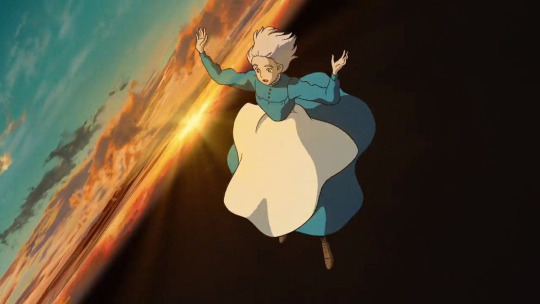
Bāhubali: The Beginning (2015) - 3/10
The next morning I watched some absolute trash. This crazy, over the top Indian movie is hilarious and I could perhaps recommend it if it weren’t so long. That being said, Bāhubali was not a dumpster fire; it has a lot of good-looking visual effects and it’s easy to see the ambition for this epic story, it just doesn’t come together. There’s fun to be had with how the main character is basically the strongest man in the world and yet still comes across as just a lucky dumbass, along with all the dancing that makes no sense but is still entertaining to watch.
Seven Samurai (1954) - 10/10
If it wasn’t obvious already, Seven Samurai is a masterpiece. I reviewed this on The Sunday Movie Marathon podcast, so more thoughts can be found there.
Red Road (2006) - 6/10
Another recommendation on episode 30 of the podcast. Red Road really captures the authentic British working class experience.
Before Sunrise (1995) - 10/10
One of the best romances put to film. The first in Richard Linklater’s Before Trilogy is undoubtedly my favourite, despite its counterparts being almost equally as good. It tells the story of a young couple travelling through Europe, who happen to meet on a train and spend the day together. It is gloriously shot on location in Vienna and features some of the most interesting dialogue I’ve ever seen put to film. Heartbreakingly beautiful.
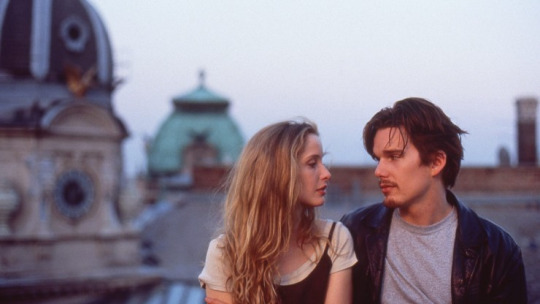
Tokyo Story (1953) - 9/10
This Japanese classic - along with being visually and sonically masterful - is a lot about appreciating the people in your life and taking the time to show them that you love them. It’s about knowing it’s never too late to rekindle old relationships if you truly want to, which is something I’ve been able to relate to in recent years. It broke my heart in two. Tokyo Story will make you want to call your mother.
Before Sunset (2004) - 10/10
Almost a decade after Sunrise, Sunset carries a sombre yet relieving feeling. Again, the performances from Julie Delpy and Ethan Hawke take me away, evoking nostalgic feelings as they stroll through the contemporary Parisian streets. There is no regret in me for buying the Criterion blu-ray boxset for this trilogy.
Before Midnight (2013) - 10/10
Here, Linklater cements this trilogy as one of the best in film history. It’s certainly not the ending I expected, yet it’s an ending I appreciate endlessly. Because it doesn’t really end. Midnight shows the troubling times of a strained relationship; one that has endured so long and despite initially feeling almost dreamlike in how idealistically that first encounter was portrayed, the cracks appear as the film forces you to come to terms with the fact that fairy-tale romances just don’t exist. Relationships require effort and sacrifice and sometimes the ones that truly work are those that endure through all the rough patches to emerge stronger.
The Holy Mountain (1973) - 10/10
Jodorowsky’s masterpiece is absolute insanity. I talked more about it on The Sunday Movie Marathon podcast.

The Grand Budapest Hotel (2014) - 10/10
Another watch for Grand Budapest because I bought the Criterion blu-ray. As unalterably perfect as ever.
Blue Jay (2016) - 6/10
Rather good up to a point. My co-hosts and I did not agree on how good this movie was, which is a discussion you can listen to on my podcast.
Shadow and Bone: The Afterparty (2021) - 3/10
For what it’s worth, I really enjoyed the first season of Shadow and Bone, which is why I wanted to see what ‘The Afterparty’ was about. This could have been a lot better and much less annoying if all those terrible comedians weren’t hosting and telling bad jokes. I don’t want to see Fortune Feimster attempt to tell a joke about oiling her body as the cast of the show sit awkwardly in their homes over Zoom. If it had simply been a half hour, 45 minute chat with the cast and crew about how they made the show and their thoughts on it, a lot of embarrassment and time-wasting could have been spared.
Wadjda (2012) - 6/10
Another recommendation discussed at length on The Sunday Movie Marathon. Wadjda was pretty interesting from a cultural perspective but largely familiar in terms of story structure.

Freddy Got Fingered (2001) - 2/10
A truly terrible movie with maybe one or two scenes that stop it from being a complete catastrophe. Tom Green tried to create something that almost holds a middle finger to everyone who watches it and to some that could be a fun experience, but to me it just came across as utterly irritating. It’s simply a bunch of scenes threaded together with an incredibly loose plot. He wears the skin of a dead deer, smacks a disabled woman over and over again on the legs to turn her on, and he swings a newborn baby around a hospital room by its umbilical cord (that part was actually pretty funny). I cannot believe I watched this again, although I think I repressed a lot of it since having seen it for the first time around five years ago.
The Twilight Saga: Breaking Dawn - Part 1 - (2011)
I have to say, these movies seem to get better with each instalment. They’re still not very good though. That being said, I’m amazed at how many times I’ve watched each of the Twilight movies at this point. This time around, I watched Breaking Dawn - Part 1 with a YMS commentary track on YouTube and that made the experience a lot more entertaining. Otherwise, this film is super dumb but pretty entertaining. I would recommend watching these movies with friends.
Solaris (1972) - 8/10
Andrei Tarkovsky’s grand sci-fi epic about the emotional crises of a crew on the space station orbiting the fictional planet Solaris is much as strange and creepy as you might expect from the master Russian auter. I had wanted to watch this for a while so I bought the Criterion blu-ray and it’s just stunning. It’s clear to see the 2001: A Space Odyssey inspiration but Solaris is quite a different beast entirely.
Jaws (1975) - 4/10
I really tried to get into this classic movie, but Jaws exhibits basically everything I don’t like about Steven Spielberg’s directing. For sure, the effects are crazily good but the story itself is poorly handled and largely uninteresting. It was just a massive slog to get through.
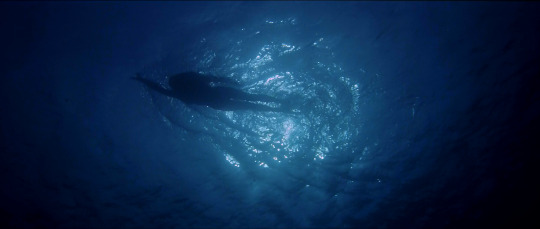
Darkman (1990) - 6/10
Sam Raimi’s superhero movie is so much fun, albeit massively stupid. Further discussion on Darkman can be found on episode 32 of The Sunday Movie Marathon podcast.
Darkman II: The Return of Durant (1995) - 1/10
Abysmal. I forgot the movie as I watched it. This was part of a marathon my friends and I did for episode 32 of our podcast.
Darkman III: Die Darkman Die (1996) - 1/10
Perhaps this trilogy is not so great after all. Only marginally better than Darkman II but still pretty terrible. More thoughts on episode 32 of my podcast.
F For Fake (1973) - 8/10
Rewatching this proved to be a worthwhile decision. Albeit slightly boring, there’s no denying how crazy the story of this documentary about art forgers is. The standout however, is the director himself. Orson Welles makes a lot of this film about himself and how hot his girlfriend is and it is hilarious.
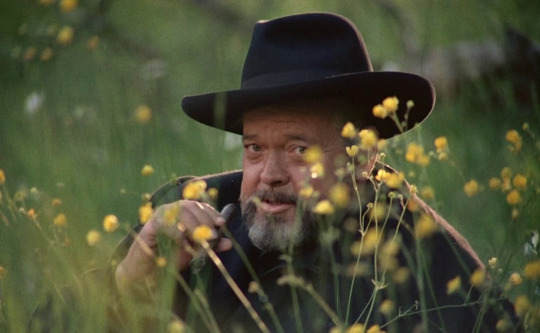
The Mitchells vs. The Machines (2021) - 4/10
More style over substance, Sony’s new animated adventure wants so much to be in trend with the current internet culture but it simply doesn’t understand what it’s emulating. There’s a nyan cat reference, for crying out loud. For every joke that works, there are about ten more that do not and were it not for the wonderful animation, it simply wouldn’t be getting so much praise.
Taxi Driver (1976) - 10/10
The first movie I’ve seen in a cinema since 2020 and damn it was good to be back! I’ve already reviewed Taxi Driver in my March wrap-up but seeing it in the cinema was a real treat.
Irreversible (2002) - 8/10
One of the most viscerally horrendous experiences I’ve ever had while watching a movie. I cannot believe a friend of mine gave me the DVD to watch. More thoughts on episode 32 of The Sunday Movie Marathon podcast. Don’t watch it with the family.
The Golden Compass (2007) - 1/10
I had no recollection of this being as bad as it is. The Golden Compass is the definition of a factory mandated movie. Nothing it does on its own is worth any kind of merit. I would say, if you wanted an experience like what this tries to communicate, a better option by far is the BBC series, His Dark Materials. More of my thoughts can be found in the review I wrote on Letterboxd.
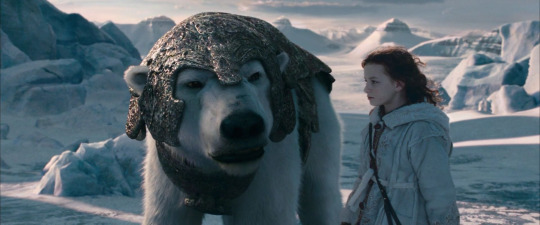
Antichrist (2009) - 8/10
Lars von Trier is nothing if not provocative and I can understand why someone would not like Antichrist, but I enjoyed it quite a lot. After watching it, I wrote a slightly disjointed summary of my interpretations of this highly metaphorical movie in the group chat, so fair warning for a bit of spoilers and graphic descriptions:
It's like, the patriarchy, man! Oppression! Men are the rational thinkers with big brains and the women just cry and be emotional. So she's seen as crazy when she's smashing his cock and driving a drill through his leg to keep him weighted down. Like, how does he like it, ya know?
So then she mutilates herself like she did with him and now they're both wounded, but the animals crowd around her (and the crow that he couldn't kill because it's Mother nature, not Father nature, duh). Then he kills her, even though she could've killed him loads of times but didn't. So it's like "haha big win for the man who was subjected to such horrific torture. Victory!"
And then all the women with no faces come out of the woods because it's like a constant cycle.
Manchester By The Sea (2016) - 6/10
Great performances in this super sad movie. I can’t say I got too much out of it though.
Roar (1981) - 9/10
Watching Roar again was still as terrifying an experience as the first time. If you want to watch something that’s loose on plot with poor acting but with real big cats getting in the way of production and physically attacking people, look no further. This is the scariest movie I’ve ever seen because it’s all basically real. Cannot recommend it enough.
Eyes Without A Face (1960) - 8/10
I’m glad I checked this old French movie out again. There’s a lot to marvel at in so many aspects, what with the premise itself - a mad surgeon taking the faces from unsuspecting women and transplanting them onto another - being incredibly unique for the time. Short, sweet and entertaining!

Se7en (1995) - 10/10
The first in a David Fincher marathon we did for The Sunday Movie Marathon, episode 33.
Zodiac (2007) - 10/10
Second in the marathon, as it was getting late, we decided to watch half that evening and the last half on the following evening. Zodiac is a brilliant movie and you can hear more of my thoughts on the podcast (though I apologise; my audio is not the best in this episode).
Gone Girl (2014) - 10/10
My favourite Fincher movie. More insights into this masterpiece in episode 33 of the podcast.
Friends: The Reunion (2021) - 6/10
It was heartwarming to see the old actors for this great show together again. I talked about the Friends reunion film at length in episode 33 of my podcast.

Wolfwalkers (2020) - 10/10
I reviewed this in an earlier post but would like to reiterate just how wonderful Wolfwalkers is. If you get the chance, please see it in the cinema. I couldn’t stop crying from how beautiful it was.
Raya and The Last Dragon (2021) - 6/10
After watching Wolfwalkers, I decided I didn’t want to go home. So I had lunch in town and booked a ticket for Disney’s Raya and The Last Dragon. A child was coughing directly behind me the entire time. Again, I reviewed this in an earlier post but generally it was decent but I have so many problems with the execution.
The Princess Bride (1987) - 9/10
Clearly I underrated this the last time I watched it. The Princess Bride is warm and hilarious with some delightfully memorable characters. A real classic!

The Invisible Kid (1988) - 1/10
About as good as you’d expect a movie with that name to be, The Invisible Kid was a pick for The Sunday Movie Marathon podcast, the discussion for which you can listen to in episode 34.
Babel (2006) - 9/10
The same night that I watched The Invisible Kid, I watched a masterful and dour drama from the director of Birdman and The Revenant. Babel calls back to an earlier movie of Iñárritu’s, called Amores Perros and as I was informed while we watched this for the podcast, it turns out Babel is part of a trilogy alongside the aforementioned film. More thoughts in episode 34 of the podcast.
Snake Eyes (1998) - 1/10
After feeling thoroughly emotionally wiped out after Babel, we immediately watched another recommendation for the podcast: Snake Eyes, starring Nicolas Cage. This was a truly underwhelming experience and for more of a breakdown into what makes this movie so bad, you can listen to us talk about it on the podcast.
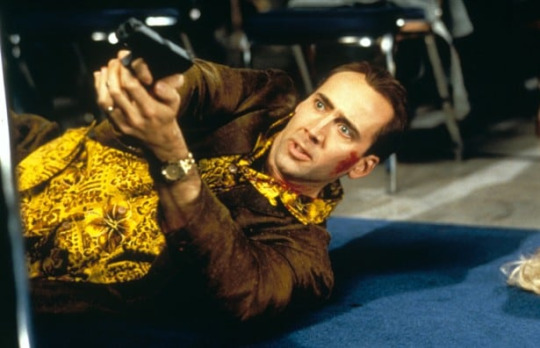
#may#movies#wrap-up#film#follow for more#Twitter: @MHShukster#tenet#nomadland#the prince of egypt#chinatown#howl's moving castle#bahubali: the beginning#seven samurai#red road#before sunrise#tokyo story#before sunset#before midnight#the holy mountain#the grand budapest hotel#blue jay#shadow and bone#shadow and bone: the afterparty#wadjda#freddy got fingered#the twilight saga: breaking dawn - part 1#solaris#jaws#darkman#darkman ii: the return of durant
118 notes
·
View notes
Text
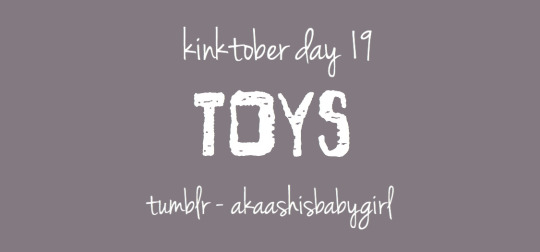
Words: 1817
Pairings: Ukai x reader
Warnings: characters are aged up, public, toys use – vibrating panties
A/n: woah, I was looking forward to writing this one, so I hope you all enjoy it too!! I hope you’re enjoying kinktober so far. I can’t believe that we’re nearly already nearly 20 days into it
A Saturday morning. The same Saturday morning as every other Saturday. Like always, you were to help your boyfriend with his store. You worked there every other day, taking care of the store from time to time when Ukai Keishin, your boyfriend, was out coaching the Karasuno High Volleyball team at the high school. You and Ukai met back in your high schools’ days, falling deeply in love with the setter of the boys’ volleyball team. Surprisingly, the two of you were one of those high school couples which actually lasted.
“Keishin,” you groaned, rolling over to meet your boyfriend, whose large figure was still tucked underneath the soft sheets of your bed.
“Keishin,” you began to shake him lightly in an attempt to wake him up.
“What is it, babe?” he groaned slightly, hands moving up to rub his eyes, trying to wake himself up.
“It’s nearly nine o’clock. We have to wake up and get ready to open the shop, babe,” you explained, sitting up in the bed, back now moving to rest against the headboard.
“Fuck,” he cursed, “Is it nearly nine am already?” he sighed, “I just wanna stay in bed with you and not move.”
“I would love that too, babe, but unfortunately, there are people who are expecting the store to be open today,” you rebutted.
“Why can’t you ask the others to open the store today? We’re not the only workers there, you know.”
“It’s a possibility, but today, Shimada-san is going to visit his nephews and nieces today and Takinoue-san is spending the day with his family. It would be rude to interrupt them and ask them to open the shop, especially when we’re free and have nothing to do.”
“Then why don’t we do something too, and just say that the store’s closed today.”
“Keishin! I’ve already told you; we can’t do that. I know that you’re tired and you don’t want to get out of bed, but you’re the owner of the store. But, if you really do not feel like going, I’m happy to go by myself. Though, I don’t think that’s such a good idea, especially with Sato-kun and Miyazaki-kun spending their times around the store. They might even try and hit on me again,” you sighed, but smirked to yourself, knowing that it was the perfect way to get Ukai to the store with you.
“As bossy as ever. Trying to guilt trip me into coming to work today with you… fine. But – that’s only because I don’t want those filthy students near you,” Ukai admitted.
He hated the idea of younger boys, or even any boy in general seeming interested in you. You are his and he is yours. Ukai wouldn’t ever let anyone try and come in between your relationship.
“I’m going for a shower,” you announced, pulling yourself from underneath the soft bedsheets, your feet meeting with the soft carpet floorboards.
Your body felt soft underneath the warm water of the shower. The water itself was enough to wake you up in the morning, your eyes beginning to relax to the soft sunlight which glowed in through the bathroom window. Slipping yourself from your relaxing shower, you wrapped the white bathroom towel around your wet body, walking back to the bedroom. Ukai wasn’t in the room, showing he was probably already dressed and grabbing something to eat.
A small smile spread across your face, seeing how a soft pink dress and a pair of matching panties and a bra had been left out on the bedsheets for you. Wiping your body with the towel, you slipped on the panties, as well as the matching bra, before slipping the light pink dress onto your body. You checked yourself out in the mirror, smiling lightly at the choice of clothing your boyfriend picked out for you. He always did cute things like that every once in a while.
“There you are,” he muttered as you walked out of the bedroom, smirking at the dress you wore.
“As horny as ever,” you joked, picking up your bag from the counter, grabbing a slice of toast which sat in Ukai’s plate.
“Hey! That was mine!” he argued, frowning.
“Well it’s mine now,” you teased, winking at him.
Ukai sighed, but with a smile on his face. He stood up from his seat, his hand now moving to wrap around your waist as he grabbed the car keys, “Let’s get going.”
The drive to the store wasn’t too far away, but not too close to the apartment the two of you shared. You flicked the light switch on, watching how the store suddenly lit up with bright lights.
“Alright, what’s there to be done?” you ask, setting your bag down in the small room at the back of the store.
“There are boxers over there with items which need to be put back onto the shelves.”
“Alright, I can do that,” you smiled, a soft, warm smile spreading across your face.
Lifting the smaller box in your hands, you moved to begin placing items on the shelves. Ukai moved to the front of the shop, switching the sign from saying closed to open.
Your boyfriend seated himself down on the small stool which was seated at the counter, flipping through one of the magazines as you continued to stock the shelves of the items that needed to be put up.
Not too long after, the shop got its first customer. The same old lady who liked to come in to buy some items she needed. You welcomed her with a small smile on your face as Ukai was lost in the news that was being spread through the magazine, even agreeing to help her if she needed it. The older lady kindly thanked you on her way out of the store.
“Are you just going to sit around all day and do nothing?” you stand in front of the register, arms folded in front of you as you stared at your boyfriend.
“I mean, I could? I did say I didn’t wanna be here,” he added.
“Keishin!”
“Okay, sorry, sorry, I’ll come help with the larger boxes,” he placed his arms up in a way of saying he surrendered. You chuckled, moving to the back room of the store to find another box of items that needed to be shelved. Ukai took a larger box, carrying it out to the isle the items were in, which, thankfully for him, was the same isle you were currently in.
For a small shop, it did need a lot of work. It attracted customers who lived in the area, as it was local and in a good spot for everyone to go to. The store pretty much sold everything people needed. It had cooking equipment, utensils, bathroom products, some medicines, food, even condoms, which Ukai loved to bring home after a long day of work and throw them down onto your shared bed as he tries to get you into the mood.
“You’re so lazy,” you commented, as you saw him slowly moving the bathroom items to the shelves.
“I’m not lazy. I’m just tired.”
“Maybe you’re tired because you wanted to go a couple extra rounds last night,” you teased.
Thankfully, after saying this, more people walked into the store. You were grateful they hadn’t walked in seconds earlier to hear the sexual comment you had just made to your boyfriend.
Ukai turned his head, smirking to himself as another customer made their way into the store. He reached his hand into his pocket, his thumb now ghosting over the small button on the remote that sat in his pocket.
Your body froze and legs began to tremble. small vibrations were pressed up around your womanhood, just nearing your clit, the spot where you were most sensitive.
“When did you have time to swap them…” you began, but suddenly remembered that Ukai was the one who picked out your clothes this morning.
“You son of a...”
“Hey, do be quiet now. You don’t want everyone to know what’s going on here, don’t you?” he asked, turning the level of the vibrator higher by one. His finger twisted your hair around his digit, “You don’t want everyone to know that your boyfriend swapped your regular panties with some vibrating ones. So, I suggest you be quiet.”
His voice was cold and commanding, which made you even weaker. It was the same tone he used in the bedroom, whenever he was to take full control over you.
“I-I think I gotta sit down,” you said, as you felt your panties become damper.
“Alright, suit yourself babe,” Ukai chuckled, “I’ll continue stocking these to the shelves.”
You tried as quickly as you could to stumble yourself over to the counter, sitting yourself down on the small stool.
A few hours had passed. The vibrations had stopped every once in a while, only to start back up again whenever a customer got too close, or when you weren’t doing anything. Thankfully, Ukai had kept a phone charger at the store. It was next to impossible to stand up, not with the way your slick had dripped from your panties and onto the seat below. There were even times when everyone had left the store, Ukai had turned the level of the vibrator up to its highest setting, having you climax on the chair below.
The end of the day was nearing, majority of the day had been spent sitting on that chair, your cum and arousal staining it. Ukai walked over to you, about thirty minutes left until the shop was to close up for the day.
“Can’t we just close up earlier today?” you asked, a soft whine leaving your lips.
Ukai could only chuckle, “Oh, babe. You were the one trying to get me to come here this morning, and here you are wanting to leave so soon?” he teased.
“Keishin… please,” you tried begging.
“No can do babe. We have to stay until closing time.”
Ukai moved to press a kiss onto your lips as he saw another customer walk into the store, “I’ll be back soon. This last customer, alright?”
“Keishin… can I please sit in the back room?” you asked, not wanting to stay in the eye view of the customers.
“This. Last. Customer,” his voice was harsh, his dark coloured eyes staring down at your shaking body, “How many times have you cum?”
“S-Six…”
“Only six?”
“Y-Yes, Keishin.”
You felt the feeling of the vibrator slight to die down, until it was no more.
He had turned it off.
“K-Keishin… it’s off?” you stated, wondering if he knew that small detail or not.
“I know it is, babe. I have to make sure you’re okay. After all, we’re going to have some fun when we get home. I can’t have you passing out on me now.”
#haikyuu#haikyuu smut#haikyuu writing#haikyuu headcanons#haikyuu!!#haikyū!!#haikyuu x y/n#haikyuu x reader#haikyuu x you#haikyuu scenarios#ukai x reader#ukai smut#ukai keishin#ukai#hq ukai
187 notes
·
View notes
Text
luca spoilers i guess
(the term ‘queer’ here is used as a umbrella term for the lgbtq+ community)
I genuinely do not understand the amount of people that are like ‘nooo Luca is a story about pure friendship it doesn’t have to be romance’ or ‘they’re just kids, they don’t know enough about LGBTQ+ to truly know their sexualities’ and trashing others for seeing it that way. I watched it online, and the number of comments saying “I liked it until others saw it as a gay story” and “im not watching this!!1! why is everything gay!!!” legitimately saddened me.
(first of all, the second critique just isn’t true. if they’re exposed to LGBTQ+ media, why wouldn’t they be comfortable with their identities?)
and sure, if I hadn’t been following the critiques of this movie and just went in blind, I wouldn’t have picked up on the idea that they even would be a couple. to me it didn’t read like that, and only thought of it as sort of Miyazaki’s idea of friendship (“where the two mutually inspire each other to live”), but I respect the concept and the people who hold it.
because if you’re making a story about people hiding their identities to fit in and live life scared of being exposed, knowing the people they love will lose their trust in them and ultimately turn against them because of existing prejudices? it will always read like a queer allegory to those in the community. see danny phantom and how, despite its creator being queerphobic in general, the fandom unanimously agrees that the story of its titular protagonist is a transgender one.
and the scene where luca “outs” alberto as a sea monster to ercole, without revealing the fact that he himself is one too, and how utterly betrayed he is? surely you see how similar to the queer journey this story is?
so what if the producers have said the protagonists are not gay? why aren’t our interpretations valid just because the creator says so? media reads differently to different people, that’s just how it is! otherwise, we’d have shunned every piece of pre-1800s literature for their misogyny and racism. why should we share the same worldview as their authors?
also, it really says a lot about the lack of representation and the lack of awareness towards it if people are criticising others for wanting gay stuff and not, well, questioning where this desire came from
I dunno really, these are just some thoughts I guess. the movie wasn’t the best, especially story-beat-wise and its ending, but it was definitely a joy to watch! and screw anyone who tries to devalue another person’s watching experience
40 notes
·
View notes
Text
FEATURE: How the 2011 Tohoku Earthquake and Tsunami Influenced Anime Over the Past Decade
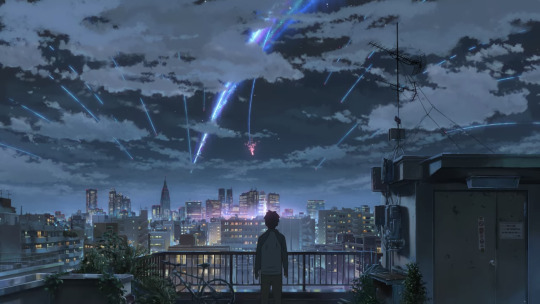
Image via Netflix
In a single moment, everything changed; after one great shake of the earth, the world was never the same again. Today marks the 10th anniversary of the 2011 Tohoku earthquake and tsunami, also known as 3.11 in Japan. At a magnitude of 9.0, it was the biggest earthquake to ever hit the island. The earthquake, and the subsequent tsunami that followed, also killed an estimated 15,899, injured 6,157, and was the most expensive natural disaster in history. The meltdown of the Fukushima Daini Nuclear Power Plant followed — rendering parts of Japan uninhabitable to this day — with many still unable to go back to their home even ten years on.
The shaking was felt all the way in Tokyo and beyond, leaving physical scars on the world’s biggest metropolitan area. This was nothing compared to the devastation seen in the prefectures of Miyagi, Fukushima, and Iwate. For those who lived through the event, whether that be in Tohoku or Tokyo, the feelings of that day have left psychological scars that have influenced their daily lives.
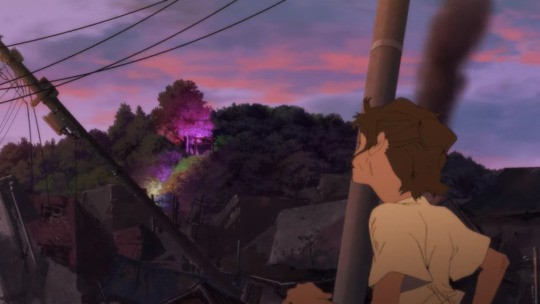
Image via Netflix
Aftershocks from the seismic event can still be felt even today: a magnitude 7.3 earthquake hit the region a little under a month ago, raising fears that another big quake could shake Japan at any time in the near future.
For creators living in Japan, these overwhelming emotions have manifested in their works. Creators such as Hayao Miyazaki, Masaaki Yuasa, Hideaki Anno, and Makoto Shinkai have internalized the events that transpired in their backyard and used 3.11 to help spread awareness, unravel some of the hanging threads, or even try and bring hope and happiness to fans.
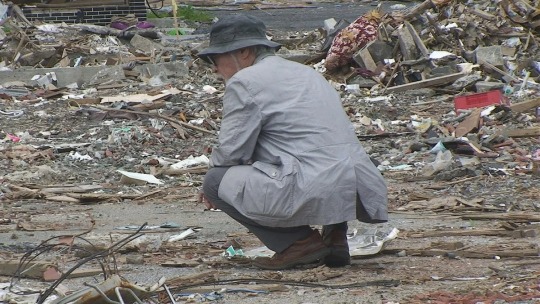
Hayao Miyazaki looking at the debris leftover from 3.11 in an NHK documentary
Image via NHK
Hayao Miyazaki isn’t one to mince words and always just gets on with the job. A few weeks after 3.11, the Studio Ghibli director introduced his son’s latest work at the time, From Up on Poppy Hill. While Miyazaki tried to keep the press focused on the film, inevitably the topic of the tragedy from two weeks ago arose. Responding to why he felt it was okay to hold a press conference after the earthquake, Miyazaki spoke about his local bakery, explaining that “the old man at the bakery where I always buy dumplings and sweets has continued to make bread. That's why I think we should keep making movies.”
At the time, Miyazaki dismissed the thought that 3.11 would affect how he made his next work. But in a 2013 interview with Jiji upon the release of his then “final work” The Wind Rises, the director said the film “has not been affected by the earthquake or the nuclear accident. [The idea] was there from the beginning. I think that the times have caught up with us and overtaken us.” The Wind Rises contains a very realistic – almost chilling – interpretation of the 1923 Great Kanto earthquake.
youtube
The earthquake scene from The Wind Rises
For Japan Sinks 2020, Masaaki Yuasa used some of his own experiences to highlight how characters would be feeling in the moment. In multiple scenes, the main characters are left worrying about what is going on without a clear line of communication – in fact, sometimes getting misinformation from sources not fully aware of the situation.
Yuasa himself explained in an interview in AnimeAnime that he felt like he didn’t know what was the “correct information” when he felt the quake in Tokyo in 2011. As he looked for information online, he heard rumors that Tokyo was in imminent danger. He was scared. Reflecting, Yuasa knew in his “heart” that he wasn’t as scared as those in the Tohoku region, but was “horrified” by what he saw on the news. Yuasa used a lot of those emotions he felt at the time to aid in telling the Japan Sinks 2020 story.
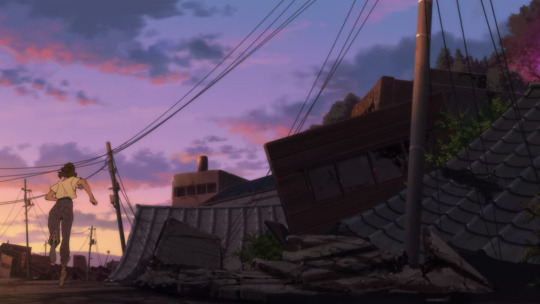
Image via Netflix
But it wasn’t just anime creators who were affected by 3.11. The 8th part of the JoJo's Bizarre Adventure manga series, JoJolion, debuted only a few months after the quake in 2011. Set in a town called Morioh (similar to the town in Diamond is Unbreakable), the location is based on manga creator Hirohiko Araki’s hometown of Sendai. The manga was being conceptualized when the earthquake occurred and Araki felt that he “couldn't avoid” touching on the subject in the series, he said in an Asashi Shimbun interview in 2014.
Araki’s family home, which had been around for 14 generations, was also swept away in the tsunami. He added that was shocked at the loss of his childhood home and felt that he should draw manga to bring entertainment to readers and fans.
Araki wasn’t the only manga creator to touch on the events of 3.11 in their long-running series. Tetsu Kariya’s long-running series Oshinbo touched on some controversial aspects of the aftermath of the tragedy, with one of the characters in the series suffering from a nosebleed after being in the town of Futaba – a town that is still not open to the public.
This caused an outcry with government officials on the national and prefectural level, with Prime Minister Shinzo Abe saying that “the government will make the best effort to take action against baseless rumors” in reference to the manga. These protests saw the collected volume version of the arc change some of the wording slightly as to “clarify the intention of what was said," and that "some of the characters' lines have been altered.” The series has been on hiatus after the arc ended two chapters later in May 2014.
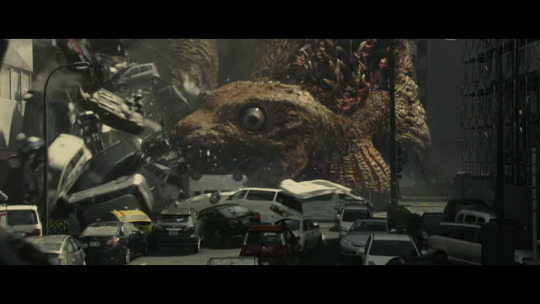
Image via Netflix
The Japanese government was also at the forefront of Hideaki Anno’s 2016 film Shin Godzilla, with many reviewers noting the similarities between the government in the film and what had occurred in the aftermath of 3.11. As Godzilla walks the neighborhoods of Kanagawa, waters rise, boats come ashore, and people are fleeing en-masse, meanwhile, the government is claiming that everything will be okay.
This sharp social satire of the events may be skin deep as the film goes on, but exposes the fact that Japan has a recent event that is very real and emotive to reference. Shin Godzilla Producer Akihiro Yamauchi explained in a 2016 Nippon.com interview that 3.11 “changed Japan more than anything else in the past 12 years.” He went on to say that the film had the option of “escaping into fantasy...but Anno-san and I talked it over and we both agreed that an approach like that would be meaningless.”
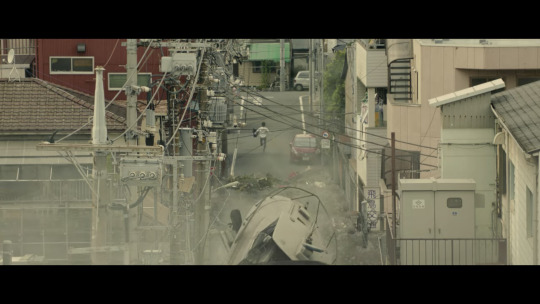
Image via Netflix
Makoto Shinkai’s 2016 movie Your Name, was directly influenced by the 2011 earthquake and the change in the psyche of the Japanese people. Taki, the male protagonist, at one moment in the movie says “You will never know when Tokyo could become like this,” vocalizing the fear that festers away in many people living in Japan.
Genki Kawamura, a producer on both Your Name and Weathering with You, explained at a discussion at the Aoyama Shachu think tank in 2019 that “Your Name is aware of the Great East Japan earthquake.” Shinkai later explained in a 2017 interview with Huffington Post Japan that the disaster aspect of Your Name is only the underlying layer of the film, and the film had to end the way it did for it to feel complete to both him and the audience.
In a 2018 Makoto Shinkai Exhibition in Sendai, the first prototype sketch drawn of Your Name by Shinkai was shown to the public. It depicted the area of Yuriage in Natori City, Miyagi prefecture, which was completely wiped out in the tsunami. The population of the area only had 30 minutes to evacuate before waters overtook the town. There weren’t many survivors.
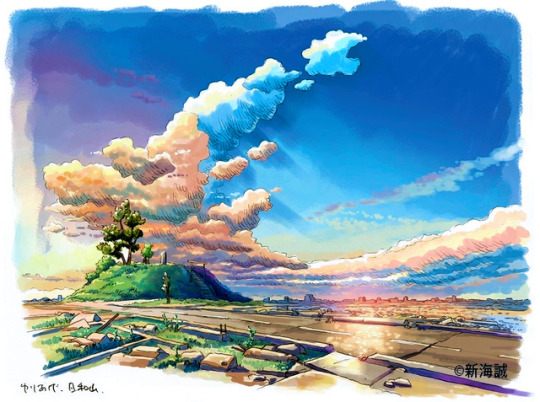
Image via Asahi Shimbun
Shinkai visited the area of Yuriage in July 2011 and drew the sketch shortly after, which later became the springboard for what then became Your Name. He said solemnly in a TBS program “This could have been my town.”
Shinkai explained in the Huffington Post interview that 3.11 changed the way people in Japan thought about the world. "Before they’d think that “somehow...Japanese society will continue as it is," he said. "But since 2011, I think that idea has collapsed. The town does not remain a town forever.”
Because of this, Shinkai decided to focus on the little things that made up life: A late train, cutting up food, texting. Shinkai thought it was “necessary to draw meaning from the monotony of daily life.” Nowadays these beautifully crafted moments from Shinkai’s works are shared online as some sort of social media anime ASMR.
In the end, Shinkai’s main driving factor for the film was to make the audience “happy.” And it struck a chord with a wide audience, as the film would later go on to become the third highest-grossing anime film of all time worldwide.

Image via Netflix
As we look back at how one event changed the world view of many, it’s good to know that despite the hardships faced in the unexpected, the desire to create and bring smiles to audiences perseveres. Many creators have used 3.11 as a chance to reflect, and it's only to be seen how the long tail of 3.11 continues to impact creators and their works.
The Tohoku region is still feeling the effects of the 2011 Tohoku earthquake and tsunami, with families torn apart and homes unable to be returned to. Japan NPO Center has a website set up with ways to donate to local charities and not-for-profit organizations within the Tohoku region that has been set up to serve affected communities.
Daryl Harding is a Japan Correspondent for Crunchyroll News. He also runs a YouTube channel about Japan stuff called TheDoctorDazza, tweets at @DoctorDazza, and posts photos of his travels on Instagram.
Do you love writing? Do you love anime? If you have an idea for a features story, pitch it to Crunchyroll Features.
By: Daryl Harding
9 notes
·
View notes
Text
CASE STUDIES AND INSPIRATIONS.
Sleeping Beauty
Disney’s notorious and classic movie, Sleeping Beauty, was released in theaters on January 29th, 1959. The movie centers around a young princess, Aurora, who was cursed at a young age to prick her finger on a sewing wheel and to fall into a deep sleep on the day of her sixteenth birthday. At the end of the story, the Prince comes to her aid, by getting rid of this curse with a kiss. While it has been re-released four times, it is also the second highest grossing movie of 1969.
The writing for Sleeping Beauty began in 1951, after Cinderella was released and the success it followed. Some of the elements that are found in Sleeping Beauty were taken from Snow White and the Seven Dwarves, although that doesn’t come as much of a surprise. Alongside Snow White and the Seven Dwarves and Cinderella, Sleeping Beauty was the third fairy tale movie released by Disney, and the last to be released for some time, before returning to them with The Little Mermaid in 1989.
During the production of the movie, there was a series of replacements of directors. While the movie was originally led by director Wilfred Jackson, he had a heart attack in 1953, leaving the work to the directing animator, Larson. Disney would eventually replace Larson with Clyde Geronimi.
With this movie, Disney wanted the “film’s design aesthetic to be completely unique to anything the studio had previously crafted.” The idea for this movie was to go with a “moving tapestry,” in a sense, as if it was a moving illustration. This was a result of art director John Hench’s seeing the 16th century unicorn tapestries artwork at the Metropolitan Museum of Art in New York City. Disney also wanted the work to be as detailed as possible with, both, the character designs and the backgrounds, this work falling on background painter, Eyvind Earle, who worked in the studio for only three years.
And this, specifically, is exactly why I wanted to include Sleeping Beauty as one of my case studies for my animation. While the overall aesthetic, color palettes and style behind Disney’s Sleeping Beauty resembles the one I envisioned for Mavis and her world, Eyvind Earle’s masterpieces are one of the things that stood out to me the most. While he had previously worked on projects such as Peter Pan (1953), For Whom the Bulls Toil (1953) and Lady and the Tramp (1955), he “truly left his mark” with Disney’s Sleeping Beauty. He was greatly notorious for his “lush landscapes” and strong verticals. After Disney saw his work, he decided that, instead of having the background artists follow on to the animators’ footsteps, he’d have the opposite, where Earle would lead with his paintings, and the animators would follow in with his style. As a matter of fact, “the animators found it difficult, even impossible, to translate Earle’s detail-laden style into viable character designs.”

Sadly, the movie was a “financial flop.” Not necessarily because of its art direction, but because, as author Bob Thomas noted, “the emphasis was on visual beauty and spectacular effects.” Furthermore, the movie was “released in Super Technirama 70mm, which means there was a higher level of detail and stylisation,” being a huge step forward in the animation field at the time. It also featured a significant transformation in terms of animating, where the traditional “round imagery” turned to a flatter and more graphic sophistication.
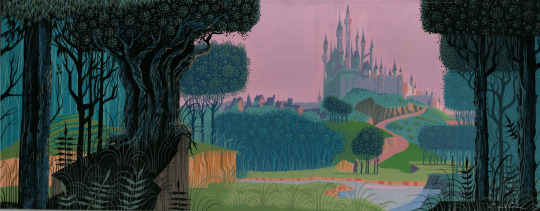
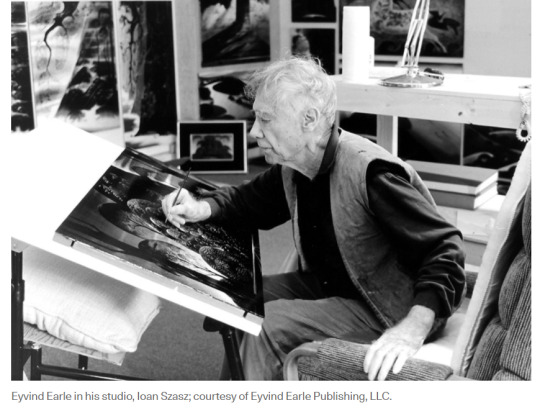
Similarly, in terms of style, I also wanted to include Disney’s One Hundred and One Dalmatians (1961) and Pinocchio (1940).
References:
Cain, A. (2017) This Artist Made Disney’s “Sleeping Beauty” Enchanting - and Nearly Impossible to Animate. Available at: https://www.artsy.net/article/artsy-editorial-artist-made-disneys-sleeping-beauty-enchanting-impossible-animate.
Jamieson, D. (2020) The House of Mouse Project - “Sleeping Beauty”. Available at https://thejamreport.com/2020/04/22/the-house-of-mouse-sleeping-beauty/
Deja, A. (2013) Deja View: The Art of Sleeping Beauty. Available at http://andreasdeja.blogspot.com/2013/01/the-art-of-sleeping-beauty.html.
Rowney, J. (2019) Sleeping Beauty Facts on 60th Anniversary - Movie that nearly Bankrupted Disney. Available at https://www.mirror.co.uk/film/sleeping-beauty-facts-60th-anniversary-13838175
Oliver, M. (2000) Eyvind Earle; Artist and Disney Painter. Available at https://www.latimes.com/archives/la-xpm-2000-jul-25-me-58783-story.html
Thumbelina
The movie Thumbelina was originally released on March 30th, 1994, by Warner Bros. It was directed and produced by director Don Bluth. While the movie was produced in the 1990s, the story itself originates from Hans Christian Andersen’s fairy tale, Thumbelina.
The story features a tiny girl born out of a tulip, after a woman struggled to have a child of her own. Thumbelina herself, like the name suggests, is the size of a thumb. Throughout the story, Thumbelina learns to love herself by undergoing several adventures. The production featured renowned voice actors, including Carol Channing, John Hurt, and even Jodi Benson, who’d notably voiced Disney’s Ariel in The Little Mermaid, in 1989. Some of the animators that worked on this movie were Paul J. Kelly, Jacques Muller and Mark Pudleiner.

When producing the movie, Merlin and Media Assetshave offered to spend 6 million dollars in the production of Thumbelina, as well as A Troll in Central Park. Unfortunately, it wasn’t as successful as it was planned to be, gaining almost half of what was put into the production of the movie. While I personally remember liked the movie as a child because of its colorful aesthetics and in the way that the animals’ features were overly exaggerated, it was also very colorful, while having a, somewhat, darker theme, when it came to the presentation of a fairy-tale world. In a sense, it stayed true to the darker hints that Hans Christian Andersen left behind his stories. Also, while the colors are plenty and to be seen everywhere throughout the movie, they’re also quite muted, and not as bright as they’d usually be for an animation that is aimed at children or at a younger audience.
Nonetheless, aside from the style and the use of colors, I also included this movie as one of my case studies because of the way that the creatures are shaped and presented. In a way, they serve as some sense of inspiration when I work with Mavis’ own universe, in terms of anthropomorphic and normal animals.
References:
The Big Cartoon Database. Thumbelina. Available at https://www.bcdb.com/bcdb/cartoon.cgi?film=23391
AllMovie. Thumbelina (1994). Available at https://www.allmovie.com/movie/v133496
Hersholt, J. Thumbelina. Available at https://andersen.sdu.dk/vaerk/hersholt/Thumbelina_e.html
Dawtrey, A. Merlin’s Magic May Animate DBE. Available at https://variety.com/1992/biz/news/merlin-s-magic-may-animate-dbe-100532/
Spirited Away

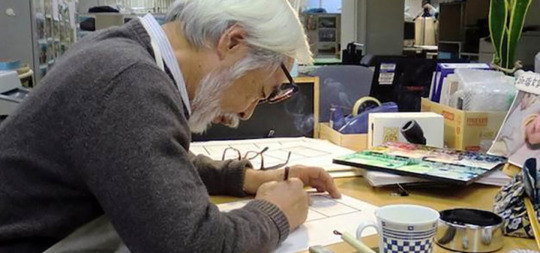
The movie was released in 2001, by the notorious Studio Ghibli. It was produced by the Studio Ghibli co-CEO Hayao Miyazaki. After releasing the greatly acclaimed Princess Mononoke, he immediately began working on this new project, after he found inspiration during an outing with some of his friends and their daughters. At that time, he noticed how girls were reading manga, and how the latter were often times focused on romance, and subjects of the sort. This made him think, ultimately asking himself:
“Is there possibly more that we can offer the young girls of this country?”
And so, the idea for Spirited Away, originally called The Spiriting Away of Sen and Chihiro, was born. The story follows the adventures of a young ten-year old girl through a “strange world of spirits,” where she needs to “find the will to live and save her parents,” who, in the meantime, had been turned into pigs. The movie began with a budget of 15 million dollars, while Disney agreed to finance 10% of its production costs. After its release, Spirited Away had a massive success, way more than the Studio could have ever imagined. In fact, “by the spring of 2002, the film would go on to shatter the previous record helf by ‘Titanic’ at the Japanese box-office.” Furthermore, “Spirited Away's $235 million not only sunk Titanic, but also set the film as the first non-American film to make $200 million outside of the US,” surpassing Princess Mononoke’s $155 million’s box office, back in 1997.
This movie is, to this day, the highest grossing movie in Japanese history. Additionally, frequent director of notorious Pixar movies, John Lasseter, was assigned with the task of Disney’s creative consultant in the US release of Spirited Away. This was also a key factor in the commercial success of the movie outside of Japan, as John Lasseter, aside from being a highly renowned animator, was also a huge fan of Miyazaki.
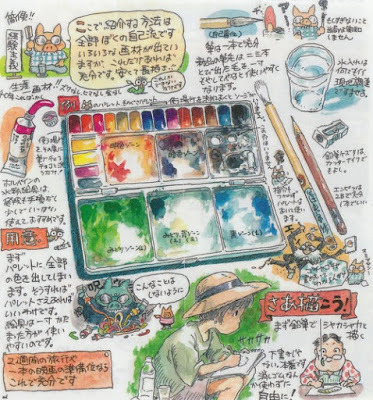
* Miyazaki is also very known for his use of watercolors. Furthermore, he often times includes anti-war, pro-environmentalism and feminist themes into his works.
In terms of the animation itself, Miyazaki wanted to explore the use of computer technology. However, while he and his team wanted to work with this media in particular, he also didn’t want it to use too much. Instead, he wanted to “keep the technology at a level to enhance the story, [and] not steal the whole show.”
“Studio Ghibli has forever shifted Japanese popular culture through their unique and constant quality storytelling coupled with beautiful visuals.”
Similarly, in terms of style and color use that I like to associate with the world and animation that I have in mind for Mavis and her own universe, I thought of Studio Ghibli’s Kiki’s Delivery Service (1989).
References:
The Making of Hayao Miyazaki’s Spirited Away - Part 1. Available at http://jimhillmedia.com/alumni1/b/michael_howe/archive/2003/04/15/1391.aspx
Herskovitz, J. “Mononoke” Creator Miyazaki Toons up Pic. Available at https://variety.com/1999/film/news/mononoke-creator-miyazaki-toons-up-pic-1117759995/
Gurney, J. (2017) Watercolor Tips from Hayao Miyazaki. Available at http://gurneyjourney.blogspot.com/2017/03/watercolor-tips-from-hayao-miyazaki.html
Ewens, H. (2016) Why ‘Spirited Away’ is the Best Animated Film of All Time. Available at https://www.vice.com/en/article/8geg4b/spirited-away-ghibli-miyazaki-15th-15-year-anniversary-best-animation-hannah-ewens
Mcdonald, T. (2020) Studio Ghibli and its Affect on Japanese Culture. Available at https://www.arcgis.com/apps/Cascade/index.html?appid=b2e39738b7d140babc407db5a40415e8
BBC. (2016) Hayao Miyazaki: Japan's Godfather of Animation? Available at https://www.bbc.co.uk/news/world-asia-38074088
Honorable Mentions: Disney’s Robin Hood (1973), Tangled (2010).
#course: animation principles#animation principles term one#uni work#year 1#myportfolio#case studies
10 notes
·
View notes
Text
Eizouken v. Ratatouille: Dawn of the Creative Drive
WARNING: This critique will contain spoilers for Eizouken episodes 1-4 and the film Ratatouille. Also this is long. And yes, I had to make this or else I would’ve exploded. Enjoy.

Youtube’s TheRealJims made a video review of pixar’s Ratatouille not long ago, check it out by the way, and one thing about it caught me deep. He described Ratatouille as “a progressive kind of film, not in the political sense, but a very forward looking movie.” This line stuck with me as I begun to watch Keep Your Hands Off the Eizouken, an anime about a high schooler, inspired as a child, working her way to create anime with her friends. It wasn’t until episode 4 where mind threads started to knot, where that line about the pixar flic started to click with this anime in a way I’ve never thought of before. As such, I found that these two have a great thematic link, a connected warp between the creative minds of adults and children. Eizouken and Ratatouille do the remarkable in giving us the bouts and beauties to having a creative, “progressive” drive, and I wanted to explore how they stack up differently and similarly. And with that,,,,
The Ignition

The beginning scene of Eizouken where Midori see her inspiring anime for the first time is personally my favorite moment of the anime so far, borderline perfect. Like Remy, we already see her have this extrinsic passion for drawing once she arrives at her jungle gym of a newfound home; crude as they look, we see her seedling talent in jotting the details of her world onto paper. It’s then when she watches Future Boy Conan where her passion becomes etched in stone intrinsically. Miyazaki was her Gusteau, the bonafide inspiration that, taking it all in, made a simple hobby into a driven pursuit. Ratatouille more or less streamlines this whole moment with narration (makes sense cuz it’s a film) but they nonetheless bring home how a talent can be solidified if given the right push. Even if you didn’t have a desire to have a fulfilling career from it, you can’t deny that there was a moment in your life where something (be it a show, game, book, etc.) was the foundation to your biggest hobby, which then allowed you to explore it more as you grew up.

One thing to note is how Ratatouille handles Remy’s character with his interest. In spite of his palette gift, he doesn’t become a snob or too good towards his rat family; there’s not a moment where he claims he knows better than his skeptic father, they just idealistically disagree and their connection remains intact throughout the film. He has taste and knowledge, but isn’t smug about it. Midori is rounded the same way, she doesn’t push Kanamori or anyone to accept that anime is the best thing ever, and there’s that layer of anxiety to her love of anime that humanizes her aspirations a little more than Remy. It was a lot easier for Remy to be a cook than it was for Midori to make anything beyond concept art, or be sociable about it for that matter. At the same time, both remain humble in their ignited desires and understandably had to deal with an initial drawback to pursuing their dreams which is where...
The Helping Hands

Now, I’m not saying Midori is puppeting Tsubame or that Tsubame is a subversion of the whole rags to riches trope. I say like Linguini, Tsubame is one of the bridges for Midori to live out her desire, with the added bonus of being just as on board in scaffolding Asakusa’s passion to its most palpable form with her own dream of being an animator. Midori and Remy, be it their figurative or literal limitations, needed the likes of Linguini and Mizusaki to make things come to fruition. Even when Linguini doesn’t desirably wanna be a top chef himself, he witnesses Remy’s skill and is willing to put himself out there to work together and make the best cooking at the restaurant. Likewise, Tsubame is more than willing to work with Midori if it means not being forced into doing what her parents want and sharing that pathos of anime with a similar mind. And unlike Ratatouille, it helps that Tsubame is already adept in animating; I’ll talk to more on this later, but I’m glad Ōwara didn’t force us a character that wants to be somebody but has done nothing for herself. That’s what I noticed with both of these features, there’s a great semblance of support when passion is there but can’t progress singularly. There can/will be people out here to help you and they will come when you least expect it. Linguini and Tsubame both work well as the muscle of the cast, the character that does the heavy lifting in bringing the meal or anime to life. As such, we essentially have our director and the more hands on conductor of the project, but this all can’t be done without the producer.
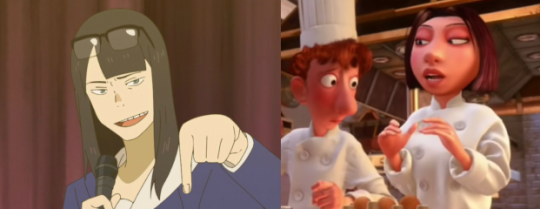
Colette and Kanamori serve well as the anchor for our respective characters; we can’t just have the four characters go nuts with whatever, there needs to be some stability, a reality to the ambitious madness that can come with creating. Kanamori isn’t teaching the two any ground rules of anime, but she understands the analytics and guidelines to keeping things on track. Colette helps Linguini, by extension Remy, on the known etiquette to being productive in the kitchen, the same can be said for Kanamori in helping Tsubame and Midori in getting the film done clean and timely. While making a meal isn’t the same as making a whole cartoon, the ins and outs of getting things done have a parallel organized track. There’s especially more to making animation, especially on a deadline, and I’m glad Eizouken doesn’t shy away from giving you the thought process in what might go on behind the scenes; it practically gives you the ropes on what could happen if you were in each of the trio’s shoes.

Additionally, these two are the most resolute of the three characters; they stick to the mission understanding where Remy and Midori are philosophically, and Tsubame and Linguini are fundamentally, coming from. She and Kanamori exhibit the practical outsider, the one to truly stick their neck out, don’t put up with bullshitting, to push the creative drive further. Both see the weight that comes to production and while Colette has her fallback in the 3rd act, they make sure everything goes as planned. They truly practice what they preach and are the glue that holds things together. The only disadvantage Colette has is that she lacks a relationship with Remy, it’s mostly indirect at the end while Asakusa and Kanamori are initially on better terms since they were already close friends. But with our characters on the move, there’s hardly such thing as a perfect run,,,,
The Fallback
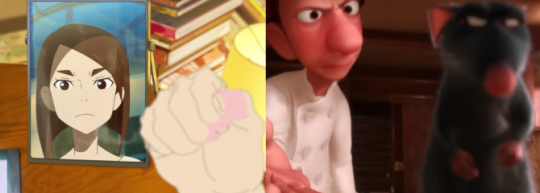
This part is where Eizouken and Ratatouille truly divide because the problems that arises for our characters come in differently. Ratatouille has more outside factors coming in with the fact that Remy is a rat and is pulled between his connection with humans vs his own kind. Eizouken is more in-fighting between the three where Tsubame and Midori’s ambitions have to face off against Kanamori’s more realistic shut downs and options. Eizouken also presents the compromises that can come with being a creator where Ratatouille reasonably montages through the hardships that can come with human puppetry and becoming an instant hit in the kitchen. Success is portrayed more consistently in Ratatouille than in Eizouken, which focuses more on the progress. It’s obvious given that, again, making food is not as time and energy consuming as making a feature; we see that animation is a lot more than just drawing all your ideas onto the equivalent to a flip book.
To sidetrack a bit, I came to agree with Jim that Monsters University is the antithesis to Ratatouille where the hard work that one puts into their dreams doesn’t mean imminent or easily delivered success. It’s a bizarro film in that, while not breaking new ground plotwise, MU is grimly realistic in that your passionate drive won’t always lead to getting the spoils you exactly want. Eizouken cleverly sits the middle of the two, where success is achievable if you put the effort in, but that effort realistically won’t go exactly how you want. Mizusaki wants everything hand-drawn and Asakusa wants a story, but come to understand that shortcuts need to happen if they want to get it done by the council meet. Kanamori isn’t crushing their aspirations for the hell of it, she makes it clear that time and the student body are not on their side. As opposed to Ratatouille, the final boss that are the critic(s) are notably secondary to getting the project done somehow. As mentioned before, I’m glad Ōwara made Tsubame already apt in animating because we can focus less on her being able to do it, more on the limitations that come with doing it. She has the skill, but has to bargain on her capabilities with what’s necessary as we see the tolls that come with the job.

Where I say these two collide somehow is the facet of the outsider putting the effort in for their goals. Remy and Midori are gifted and near encyclopedic in their trades, but are reasonably setback by both internal conflicting question of how far are they willing to go in exercising their drives. Remy more external than Midori since he could literally be killed if the truth was out too soon, but there is that self doubt in both of them where it can be hard to imagine that anyone can cook or that creating the great world is possible. It’s near the end of the arcs where they truly stand up for their beliefs and I appreciate that both handle the determined directing of our MCs in a respectable, pretty relatable way. They finally get to call the shots. They never sacrifice what could’ve been for what could be dauntingly realistic either; both offer an organic sense of optimism. But, with this optimism, comes the endgame that truly puts it all to the test in...
The Moment of Truth

Mr. Anton Ego, Skinner, and the Student Council are undoubtedly the final piece to these puzzles. It’s smart that they’re only present by the end of the arcs, only mentioned initially as the antagonistic force Remy and the Eizouken need to convince; they didn’t need to shoehorn their looming gavels any further. Naturally Skinner parallels the council president, a disingenuous hothead that antagonizes our MCs in a more unfair light while secretary Sakaki represents Ego, an intellectually honest person with actual standards and can see the forest for the trees. Eizouken’s episode 4 perfectly conceives why Kanamori is the boss, as she effortlessly confronts the allegations against them; not so much bluffing as she is spotlighting the council’s rash judgement. Unfortunately Kanamori can only debunk them so far, which leads to Midori overcoming her anxiety to demand that they’re given a chance. It’s great that Asakusa can suffer in silence for only so long before pushing herself to say something. This falls in line with Remy’s dad showing his son the grim realistic front of humans and rats before coming back to help him when he realizes Remy’s determinism. It’s like the rat says, the only way to go, “With luck, forward.”

Like the scene where Ego eats the titular dish, the moment we finally see the anime in full is almost disgustingly perfect. It’s fitting that a riot was going on before the presentation only for the action packed film to essentially come to life and throw chaos right back at everybody with powerful air waves, tank shells, and the tank itself jumping off the screen, literally blowing the audience away. Eizouken has literally more louder of a scene than Ratatouille’s, but both offer that climatic impart equally hard in their respective moments. They don’t shy away from grasping that immersive feeling of what you loved the most about food and/or animation, those invested in the film/series are basically with Ego and the student audience as those moments happen. It kinda hurts the brain how perfect these two moments are. Eizouken and Ratatouille, in a meta sense, weren’t successful only because they poke at our nostalgia or love, but of how they go the mile to convey it significantly. Ratatouille by the end, thanks to Ego, provides the apt idea of open-mindedness; that greatness can come from anywhere. Eizouken does this but adds the step that being open-minded can come with seeing what the efforts of that determined greatness can lead to. And with this, we see how it ends, or how it begins...
The Step Forward

I mentioned this before, but I loved that immediately after their demo reel finished, they weren’t worrying about any approval from the council or audience but discussing about what to improve on next. We see the soon boundless enthusiasm of the trio when, regardless of , they want to improve and do more as a team, all while the secretary approves the club in the hopes to see the fruitful potential. Compare this to Ratatouille for while Remy succeeds in convincing his family and Ego of his talent, they don’t sacrifice realism too much. Gusteau’s is naturally shut down, rats and humans aren’t suddenly living together by the end. At the same time, the movie wasn’t really about that, but about achieving small victories, optimistically grasping that palpable progress. Like Eizouken, Ratatouille leaves us with the progressive prospect that there’s the potential for more, for better.
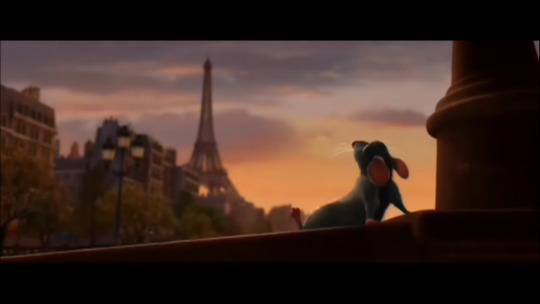
To quote Jim once more, I say what makes both Eizouken and Ratatouille work fundamentally is that they keep the finger on the pulse of their respective message(s) while still creating enjoyable moments; they don’t sacrifice the fun of getting things right for pushing why it matters. They don’t sellout the bonds between our characters for irreverent romps in the kitchen or studio. Both offer a meaningfulness to their respective crafts, blending its many flavors into a well made dish that explores what it means to create and the steps that come with it. What it means to have passion and utilize that to its capable extent. What it means to enjoy a meal while watching an impressively finished production. They’re also very well animated; thanks Yuasa and Bird.
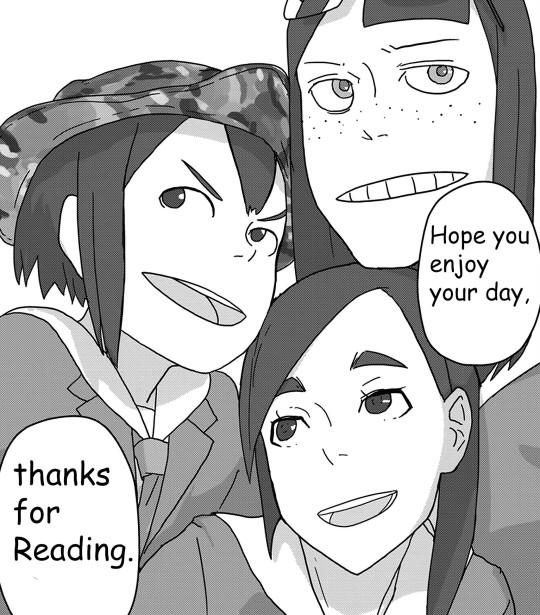
#keep your hands off eizouken!#keep your hands off the motion pictures club!#eizouken#eizouken anime#KYHOE#Ratatouille#pixar#disney#anime#animation#critique#analysis#Good Stuff#long post
142 notes
·
View notes